Trump
Full Speech & Transcript: RFK Jr. officially suspends 2024 campaign and endorses Trump
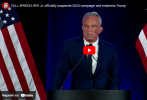 Transcript added. In this highly informed speech, for those who want to know, Robert Fitzgerald Kennedy Junior whistleblows on US corporate Deep State as, sadly, he resigns from presidential campaign. BTW, Australia takes orders from the same rotten US Deep State. We are no more a democracy than America. Our governments are in an undeclared war with us.
Transcript added. In this highly informed speech, for those who want to know, Robert Fitzgerald Kennedy Junior whistleblows on US corporate Deep State as, sadly, he resigns from presidential campaign. BTW, Australia takes orders from the same rotten US Deep State. We are no more a democracy than America. Our governments are in an undeclared war with us.
Demystifying Syria - Crosstalk discussion on Turkey, US, Kurds and Syria
 The discussion in this video opens up new topics on the confusing situation with US 'withdrawal' and Turkey incursion in Northern Syria. Particularly interesting is Marwa Osman's framing of why Turkey would want to move Syrian refugees into Northern Syria. She thinks that Erdogan (Turkey's President) has a problem with all the Syrian refugees living in his country because his people resent the presence of this large number of non-Turkish people. If Erdogan can move these refugees into an area he is trying to clear of Kurds in northern Syria, then he can put the Syrian refugees there. Many of those refugees now have Turkish papers. This would have the further benefit for Erdogan's purposes in that, once Erdogan will have moved so many people there, he will more or less control the area with their presence, since he will be organising their settlement and deployment. Video discussion with Ammar Qaqqaf, Marwa Osman, Mike Raddie and Peter Lavelle.
The discussion in this video opens up new topics on the confusing situation with US 'withdrawal' and Turkey incursion in Northern Syria. Particularly interesting is Marwa Osman's framing of why Turkey would want to move Syrian refugees into Northern Syria. She thinks that Erdogan (Turkey's President) has a problem with all the Syrian refugees living in his country because his people resent the presence of this large number of non-Turkish people. If Erdogan can move these refugees into an area he is trying to clear of Kurds in northern Syria, then he can put the Syrian refugees there. Many of those refugees now have Turkish papers. This would have the further benefit for Erdogan's purposes in that, once Erdogan will have moved so many people there, he will more or less control the area with their presence, since he will be organising their settlement and deployment. Video discussion with Ammar Qaqqaf, Marwa Osman, Mike Raddie and Peter Lavelle.
Stateless Kurds
Most Kurds have Syrian citizenship, but some do not. Syrian citizenship is modeled on French law, generally requiring a demonstration of cultural affinity - such as speaking the language. Children born in Syria must demonstrate Syrian paternity; it is not enough to have a Syrian mother. After 1945 there was a diaspora of Kurds from Turkey to Syria. The Syrian government in power during the transitional period between the fall of the UAR and the coming into power of the Baath government, was worried by this inflow from Turkey, which has long had designs on Syrian territory. In 1962 this government held a Syrian census of Kurds in the North requiring proof of residence in Syria from 1945. According to my source on this,[1] there were many illiterate Kurds in the area, without much engagement with the government, so they might not have understood the requirements, if they knew they were being made. 120 stateless Kurds resulted.
During the war in Syria that began in 2011, the United States and other NATO countries cultivated politically ambitious Kurds for their own purposes. Now they have dumped them and many Kurds are fleeing towards the parts of Syria held by the Syrian Government.
Many terrorists remain in the area, including ISIS. It is feared that Turkey will use such fighters to achieve its own ends. Erdogan, who is a member of the Muslim Brotherhood, is thought to want to establish a caliphate along the lines of the old Ottoman Empire.[2] Part of such a caliphate would involve redrawing the 1916 Sykes-Picot agreement borders to bring Northern Syria into Turkey.
Any incursion by Turkey into Syria risks being used by the United States and NATO to their own ends, which are destabilisation and power over oil reserves in the region.
NOTES
[1]"The Stateless Syrians," Tilburg University, Switzerland, May2013. https://www.refworld.org/pdfid/52a983124.pdf Note that this work was funded by Open Society Foundations, which is a multi-million dollar political engineering program that funds mass migration.
[2] https://foreignpolicy.com/2016/10/23/turkeys-religious-nationalists-want-ottoman-borders-iraq-erdogan/
Largest US Immigration Operation in a Decade Nets 680 Arrests
 United States immigration officials raided numerous Mississippi food processing plants Wednesday, arresting 680 workers in what marked the largest workplace sting in at least a decade. As reported by USA Today, the raids were planned months ago, and the largest took place at a Koch Foods Inc. plant in Morton, 40 miles east of Jackson. Workers who were confirmed to have legal status were allowed to leave the plant. Other linked operations were executed in Bay Springs, Carthage, Canton, Pelahatchie, and Sebastapol Mississippi.
United States immigration officials raided numerous Mississippi food processing plants Wednesday, arresting 680 workers in what marked the largest workplace sting in at least a decade. As reported by USA Today, the raids were planned months ago, and the largest took place at a Koch Foods Inc. plant in Morton, 40 miles east of Jackson. Workers who were confirmed to have legal status were allowed to leave the plant. Other linked operations were executed in Bay Springs, Carthage, Canton, Pelahatchie, and Sebastapol Mississippi.
Article first published at Numbers USA on Thu, Aug 8th 2019 @ 9:20 am EDT.
Matthew Albence, U.S. Immigration and Customs Enforcement’s Acting Director, told The Associated Press that the raids could be the largest such operation thus far in any single state. When Acting Director Albence was asked to comment on the fact that the raid was happening on the same day as Trump’s El Paso visit, Albence responded,
This is a long-term operation that’s been going on. Our enforcement operations are being done on a racially neutral basis. Investigations are based on evidence.
The sting was one of the most blatant demonstrations of Trump’s signature domestic priority to crack down on illegal immigration, and one of his first notable actions to crack-down on illegal hiring, one of the most prominent incentives to illegally enter the United States. “HSI’s [Homeland Security Investigations] worksite enforcement efforts are equally focused on aliens who unlawfully seek work in the U.S. as well as the employers who knowingly hire them,” HSI New Orleans Special Agent in Charge, Jere Miles said in a statement. Many are speculating that these ICE operations are part of the promised operations that were hinted at last month but suspended after President Trump gave House Democrats two weeks to produce legislative action to stem the crisis at the southern border as well as the loopholes of the current U.S. asylum policy.
According to federal officials, some of the hundreds of illegal aliens arrested on Wednesday have already been given orders of removal by an immigration judge and have refused to self-deport. Those illegal aliens will be quickly removed. Other illegal aliens have yet to go through the immigration courts and will be afforded a review process where they will make a case to remain in the U.S.
Such large shows of immigration enforcement were common under President George W. Bush, most notably at a kosher meatpacking plant in tiny Postville, Iowa, in 2008, the largest immigration operation before President Trump's most recent operation in Mississippi, netting 595 arrests. President Barack Obama avoided them, limiting his workplace immigration efforts to low-profile audits that were done outside of public view. President Trump resumed workplace raids, but the months of preparation and hefty resources they require make them rare. Last year, the administration hit a landscaping company near Toledo, Ohio, and a meatpacking plant in eastern Tennessee. The former owner of the Tennessee plant was sentenced to 18 months in prison last month.
In preparation for the arrests, a hangar at the Mississippi National Guard in Flowood, near Jackson, was set up with 2,000 meals to process employees for immigration violations on Wednesday. There were seven lines, one for each location that was hit. Buses had been lined up since early in the day to be dispatched to the plants. “I’ve never done anything like this,” Chris Heck, resident agent in charge of ICE’s Homeland Security Investigations unit in Jackson, told The Associated Press inside the hangar. “This is a very large worksite operation.”
Koch Foods, based in Park Ridge, Illinois, is one of the largest poultry producers in the U.S. and employs about 13,000 people, with operations in Mississippi, Alabama, Georgia, Illinois, Ohio and Tennessee. Forbes ranks it as the 135th largest privately held company in the U.S., with an estimated $3.2 billion in annual revenue. The company has no relation to prominent conservative political donors and activists Charles and David Koch.
U.S. Attorney for the Southern District of Mississippi Mike Hurst, who was present at the facilities, told the media at a press conference:
We are first and foremost a nation of laws and the Rule of Law is the bedrock, the very foundation, of our great country. I heard someone say that a country without borders is not a country at all and while I agree with that, I would also add that without law there is no order. Without the enforcement of law, there is no justice.
Trump's naked threats of war; Maduro's response
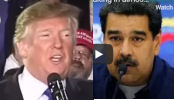 Trump made naked threats to invade Venezuela made on 19 February, in a speech truly evocative of Hitlers'. Instead of threatening Jews, Trump is threatening people he perceives as 'communists'. The unquestioning crowds, the dumbed-down US elite cheering war on, show the result of an American education system and press entirely given over to propaganda. US Congress, mostly robots under control by Neocon money, has to authorise any military action - but will they even try to stop it?
Trump made naked threats to invade Venezuela made on 19 February, in a speech truly evocative of Hitlers'. Instead of threatening Jews, Trump is threatening people he perceives as 'communists'. The unquestioning crowds, the dumbed-down US elite cheering war on, show the result of an American education system and press entirely given over to propaganda. US Congress, mostly robots under control by Neocon money, has to authorise any military action - but will they even try to stop it?
Trump's naked threat to Venezuelan soldiers
"You can choose to accept President Guaido's generous offer of amnesty to live your life in peace with your families and your countrymen or you can choose the second path, continuing to support Maduro.
If you choose this path, you will find no safe harbour, no easy exit, and no way out. You will lose everything."
Trump's naked threats to invade Venezuela made on 19 February, in a speech truly evocative of Hitlers'. Instead of threatening Jews, Trump is threatening people he perceives as 'communists'. The unquestioning crowds, the dumbed-down US elite cheering war on, show the result of an American education system and press entirely given over to propaganda.
Where is Antifa now that America and Venezuela face true Facism
Antifa - that joke - in the face of real fascism - has nothing to say. It is as if they are not even aware of what is going on.
Perfidious Democrats
The Democrats are going along with this, with the courageous exception of Congresswomen Ilhan Omar and Tulsi Gabbard.
Under US law, however, Congress must approve foreign military action and the president doesn’t have the power to act on his own. But Congress is weak on Venezuela's self-determination. Basically they don't criticise the propaganda: “I appreciate the need to squeeze Maduro,” said Eliot Engel (the Democratic chairman of the House of Representatives Foreign Affairs Committee). “But the White House must think through the potential repercussions that these sanctions could have on the Venezuelan people if Maduro does not leave office in the coming weeks.” (Source)
Himself threatened by a neocon coup, Trump illegally, against international law, works ever more feverishly for the Neocon coup in Venezuela. What Trump and the EU are all going along with is totally illegal. They are supporting the crudest violation of international law and morality.
The main lies and how the mass media promotes them
Groundhog day for Venezuela as US demands elected President Maduro surrender to its own appointed ‘president’
 1973 saw many oil producing countries become independent and nationalise their oil. Some succeeded and others, like Australia, were brought to heal. Ever since 1973, the US and Europe have been trying to reverse these nationalisations. Venezuela is a case in point.
1973 saw many oil producing countries become independent and nationalise their oil. Some succeeded and others, like Australia, were brought to heal. Ever since 1973, the US and Europe have been trying to reverse these nationalisations. Venezuela is a case in point.
In a gesture befitting Lewis Carol's Queen of Hearts, the United States has suddenly abandoned all pretences of lawful procedure and common sense by officially declaring that opposition leader, Juan Guaidó is the real president of Venezuela, not Nicolás Maduro Moros, who was actually elected President by Venezuelans.
To put things in perspective: Getting rid of President Maduro because the 2015 parliamentary election placed his own party in the minority would be like making President Trump step down because the Democrats are now in the majority in Congress - to paraphrase Venezuela's diplomat to Russia.[Article by Sheila Newman with James Sinnamon]
It is also baffling to see French President Macron call for Maduro to step down when his own country is convulsing with Gilets jaunes (Yellow Vest) protests, who all call for Macron to step down. Don't politicians have any sense of irony?
Interesting also to see Turkish President Erdogan stick up for Maduro by saying nothing can be resolved democratically without an election.
Meanwhile South America: Columbia, Brazil, Chile, are also baying for Maduro to step down, as you would expect of US lackies.
Why should Maduro step down?
Why should Maduro step down? Why is no-one talking about how US trade sanctions have impoverished Venezuela? The reason for these sanctions is that the US wants control over Venezuelan oil, which means that it must destroy the socialist government that nationalised oil. Will they go so far as to invade and bomb Venezuela like the did other oil-producers whose leaders they condemned, like Iraq, Libya, and Syria?
With the help of much money poured into Venezuela by the US Government agencies the United States government have succeeded in doing to Venezuela what they did to Ukraine in 2014 when Victoria Nuland promised the Maidan protesters face-to-face $5 billion to assist in "building democracy".
A propos of the US interference on Russia’s doorstep in Ukraine (and Georgia and the Middle East), there is symmetrical justice in Russia's plans to build a military base in Venezuela, although these may also have caused a panic in the US leading to this overt coup-attempt.
In Latin America, only Cuba, Bolivia and Mexico have defended Maduro. Mexican president, Lopez Obrador, said that Mexico has returned to the non-intervention policy Mexico practiced from the 1960s — when it resisted U.S. pressure to condemn or isolate Cuba — until 2000, when the conservative National Action Party began to adopt a more activist, U.S.-allied stance in foreign affairs. Russia, China, India and South Africa buy oil from Venezuela and are generally sympathetic or have a policy of non-interventionism.
The EU has called for new elections, but without condemning the United States meddling in Venezuela. This further reinforces the narrative or the claim that the democratically elected President Maduro is illegitimate. If new elections were called, in the current geopolitical circumstances, this would result in the ousting of President Maduro in an election rigged with many millions of United States dollars and with thousands of clandestine US intelligence agency operatives. The elections would also be conducted under the guns of the US Navy, Army, Air Force and Marine Corps in the Central American Carribean and neighboring countries on the South American continent.
This has all happened before ...
This has all happened before, but unofficially and more covertly: In 2002, a group marched on the Presidential palace demanding Hugo Chávez’s resignation, which the President refused. He was arrested and imprisoned. Pedro Carmona, President of the Venezuelan Chamber of Commerce, which receives funding from the US National Endowment for Democracy (a right-wing regime-change NGO that calls economic liberalism 'democracy'), was installed as Venezuelan President on the 11th of April 2002. On the 12th of April, the US President’s spokesman, Ari Fleischer, endorsed the Carmona government. But, on the 13th of April the Presidential guard and the army arrested Carmona. Next the opposition collected signatures from 20 per cent of the electorate required under Chávez’s constitution to initiate a referendum to sack the president, but Chávez won the referendum.
... and with the same excuses
The oil countershock of 1979 culminated in currency devaluation by one third and a change to a the Social Christians (SC) government, which remained in power until 1983, when Democratic Action (DA) or Acción Democrática, (AD) in Spanish, was returned under Jaime Lusinchi. Despite promises to diversify the economy and deliver on housing, public health and education, the situation continued to deteriorate. That is, the kind of government that the US wants to install, one that will privatise Venezuelan oil, failed to develop and diversify the economy, leaving it almost exclusively oil-dependent, with most of its population in poverty.
Hugo Chavez and Maduro were later both accused of causing this same problem of lack of economic diversification.In 2019, President Trump and Vice President Mike Pence were using it again as an excuse to rattle sabres and unilaterally denounce President Maduro and, bizarrely, recognise Juan Guaidó as the interim president of Venezuela.
Back to our history: Under Jaime Lusinchi and Acción Democrática, (AD), the Venezuelan economy was simply being mined by foreign interests, with no consideration for the self-determination of its population. In 1988 another DA president, Carlos Andrés Pérez, introduced an austerity regime, removing subsidies on gasoline as well as on a number of important consumables, culminating in hunger riots in Caracas, with a death toll of thousands.
Two attempted military coups took place against a background of continued repression in 1992 and Hugo Chávez led one of them. President Pérez later went to prison for 28 months with the government limping along under another recycled leader, Caldera, whose foreign policy was very USA friendly. In 1995, 103 per cent inflation hit the Venezuelan middle class. In 1997 doctors, university professors, and national telephone company workers went on strike. In December 1998 Hugo Chávez won the Presidency.
Hugo Chávez, the 45th President of Venezuela, died on 5 March 2013 at the age of 58. His death triggered a presidential election which was constitutionally required to be called within 30 days. Nicolás Maduro served as interim president following Chávez's death until 14 April, because the Vice President did not want to take charge of the country as Chávez had nominated Nicolas Maduro as a successor.
Juan Guaidó's Popular Will Party (Voluntad Popular)
The Popular Will party came out of the Popular Will Movement, which was formed in 2009 by the usual suspects, including Democratic Action, the right-wing US business-backed party that had privatised oil.
The Democratic Unity Roundtable (Mesa de la Unidad Democrática (MUD) is a coalition of parties, notably Democratic Action, which formed in 2010 in opposition to Hugo Chavez's United Socialist Party of Venezuela.
Popular Will is supporting Juan Guaidó's Presidential Coup attempt.
Venezuela is situated at the very north of the South American continent on the southern shore of the Caribbean Sea. Venezuela is less than 2,000 kilometres south of the southern most tip of the United States, from which, since 1945, many wars against humanity have been launched since 1945. The sum total of deaths from these wars is in the millions.
Throughout Central America, the Carribbean and the South American continent are scattered a large number of United States' military bases from which further wars against Venezuela and other sovereign Latin American countries can be launched. Clearly any national government which wishes to govern in the interests of its people and not according to the dictates of the Unite States' elites, risks attracting US intervention to transform it into a client state, with a liberal economic economy, entailing debt and privatisations.
Venezuela, Chavez, Maduro & Latin-American oil on the world stage
This part of the article is adapted from Sheila Newman, “Venezuela, Chavez & Latin-American oil on the world stage”, Chapter 10 in Sheila Newman (Ed.) The Final Energy Crisis, Second Edition, Pluto Press,2008.[1]
“In 1998, or 168 years after independence, a tiny wealthy elite was separated by a vast chasm from the rest of the people, of whom one quarter were unemployed. This seems disgusting when you realize that Venezuela was then the second biggest [oil] exporter in the world and had received around 300 billion dollars in oil sales – or the equivalent of 20 Marshall Plans - over the preceding 25 years. It was in this context that Hugo Chávez and his social plan won the elections of 6 December 1998 with 56.24% of the votes.” [2] (Nicolas Lehoucq, Paris Institute for International Studies).
President Hugo Chávez, was a social revolutionary with a giant budget. In 2006 the EIA ranked Venezuela ninth in World Oil producers and sixth in World Oil Exporters. [3] For many of his countrymen, Chávez was seen as a towering figure of hope for rescue from a nightmare which began in 1498. But his Anglo critics portrayed him as an ogre treading clumsily over political alliances and destroying Venezuela’s oil-assets.[4]
Clearly Venezuela was pursuing a different political paradigm from that of the North American-led Anglophone countries. The Chávez government endorsed a Christian socialist philosophy directly opposite to the Protestant capitalist one of a wealthy elite divinely elected on earth. In the Chávez philosophy, Christ was the first socialist, sharing wealth among the poor; a rich man might only enter heaven by giving away his possessions to the poor; a good leader should give everything to his country.[5]
One political explanation for this difference is that Latin America ‘missed out’ on the progress model which dominates North America because, colonized by medieval Catholics, it was isolated from the development of Protestantism.[6]
Sociologist, Max Weber, theorized in The Protestant Ethic and the Spirit of Capitalism (1906) that Calvinism was the midwife of capitalism, delivering to the world the concepts of the ‘work ethic’ and of election to earthly prosperity as a reflection of God’s grace.
The work of Australian engineer and social analyst, Sharon Beder, supports a contrary view that the work ethic plus the progress model are driving the world over a cliff[7] and this is pretty much Chávez’s expressed view. Chávez also apparently shares a similar perspective to Al Gore’s on global warming, but that is where the similarities end.
From the 15th C the indigenous long-term stable clan and tribal populations of Chávez’s people were ravaged by invasion, immigration, disease, dispossession and slavery. The original peoples nearly died out, then, completely disorganized, ballooned in circumstances where child labour was the only source of additional income for low-wage landless people.[8] What is now called Venezuela contained a stable population estimated at around 400,000 Amerindians in 1498.[9] (In 2018 the population was over 28 million.) In the early 16th C King Charles Martel V granted Welsers German banking firm rights to exploit the people and resources of Venezuela in payment of a debt. The colony returned to the Spanish Crown within 20 years and hereditary land grants were made to conquistadores for a time, but later declared illegal. Meanwhile the Amerindians fought back until smallpox overwhelmed most of them in 1580.[10] Not until 1821 did Simón Bolívar win the long indigenous struggle for independence.[11]
In 1921 the discovery of oil permitted agricultural and industrial development. At the start of the Second World War Venezuela’s oil production was only exceeded by that of the United States. Much of the oil concession development involved attracted US, British, and Dutch companies. There was a period of dictatorship from 1948-1958, when Venezuela again became a democracy. It founded OPEC in 1960.[12]
The historic inequities of colonial land distribution[13] guaranteed a large population of impoverished rural labourers. As oil prices waxed and waned, productive agricultural holdings were neglected and waves of poor people left the country regions to look for work in the city, creating the slum of Caracas. Between 1959 and 1964 the government redistributed rural land to 150,000 families but many resold the land to speculators, it is said, because they had little education about farming and no ready market for their product.[14] Other wealth redistribution and educative policies were carried out but these programs failed to establish themselves against a background of depressed commodity prices and political schism. Although the Democratic Action Party (DA) had played an important role in Venezuela’s first democratic period (1945-1948), in the early 1960s it was aligned with the USA, although many Venezuelans were sympathetic to the Castro regime in Cuba, which was charged with supplying arms to guerrillas in 1963.[15] The DA government became increasingly repressive in the context of continued political unrest. In 1968 the Social Christians (SC) won government and remained in power until 1973.[16]
In the wave of nationalizations following the first oil-shock, despite its US sympathies, the DA Government created the State-run oil and natural gas company, Petroleos de Venezuela SA (PdVSA) in 1975-1976. PdVSA is Venezuela’s largest employer and provides 80 per cent of export earnings but, reflecting later trends to privatization, government revenue declined from 70.6 per cent in 1981 to 38 per cent in 2000.[17]
The oil countershock of 1979 culminated in currency devaluation by one third and a change to an SC government, which remained in power until 1983, when AD was returned under Jaime Lusinchi. Despite promises to diversify the economy and deliver on housing, public health and education, the situation continued to deteriorate.
Hugo Chavez and Maduro were later both accused of causing this same problem of lack of economic diversification. In 2019, President Trump and Vice President Mike Pence were using it again as an excuse to rattle sabres and unilaterally denounce President Maduro and, bizarrely, recognise Juan Guaidó as the interim president of Venezuela.
In 1988 another AD president, Carlos Andrés Pérez, introduced an austerity regime, removing subsidies on gasoline as well as on a number of important consumables, culminating in hunger riots in Caracas, with a death toll of thousands.
Two attempted military coups took place against a background of continued repression in 1992 and Hugo Chávez led one of them. President Pérez later went to prison for 28 months with the government limping along under another recycled leader, Caldera, whose foreign policy was very USA friendly. In 1995, 103 per cent inflation hit the Venezuelan middle class. In 1997 doctors, university professors, and national telephone company workers went on strike. In December 1998 Hugo Chávez won the Presidency.
On 30 December 1999 Venezuela’s 26th constitution was approved by 71 per cent of votes. The Senate was replaced by a single chamber National Assembly, and the Bolivarian Republic of Venezuela came into being, named after the National hero. Presidential terms increased from five to six years and limitations on presidents serving a second consecutive term were lifted, but it became possible for the public to sack a president through a publicly initiated referendum. Privatisation of the oil industry, social security, health care and other major state-owned sectors was outlawed.[18]
According to the EIA, “Nearly one-half of PdVSA’s employees walked off the job on December 2, 2002 in protest against the rule of President Chávez.”[19] But another report says that they were prevented from working in a ‘bosses lock-out’ where “a small group of managers, directors, supervisors and technicians organised the sabotage of production and brought the industry almost to a halt,” and Georgetown politics Professor commented that “The opposition (…) has also been extremely irresponsible in trying to demand [Chávez’s] resignation rather than trying to seek an electoral solution.”[20] If we assume that PdVSA management was responsible for the declining returns to the State by PdVSA over the decades, then the view that this was a ‘lock-out’ to preserve an undemocratic status-quo by discrediting the Chávez Government, seems persuasive. Chávez had provoked US insecurity about oil supply by criticizing the Free Trade of the Americas Act (FTAA) and US foreign policy. The Chávez government had sacked some directors of PdVSA who were in political disagreement with the Venezuelan executive. These people then led calls for a general strike along with a variety of opposition parties and the Fedcamaras (Venezuelan Chamber of Commerce), who are supported by the US National Endowment for Democracy. A group marched on the Presidential palace demanding Chávez’s resignation, which the President refused. He was arrested and imprisoned. Pedro Carmona, President of the Venezuelan Chamber of Commerce, which receives funding from the US National Endowment for Democracy, was installed as Venezuelan President on the 11th of April. On the 12th of April, the US President’s spokesman, Ari Fleischer, endorsed the Carmona government. But, on the 13th of April the Presidential guard and the army arrested Carmona. Next the opposition collected signatures from 20 per cent of the electorate required under Chávez’s constitution to initiate a referendum to sack the president, but Chávez won the referendum.[21]
The distribution of PdVSA income had been increasingly diverted to private concerns, with returns to the State falling from 70.6 per cent in 1981 to 38.6 per cent in 2000. Despite permanent damage to production from sabotage in the industrial disputes of December 2002, Chávez’s intervention had raised PdVSA returns to the state from 38.6 per cent to 50 per cent by 2004.[22]
Venezuela had for some time been a food importer, due to the country’s very poor system of land management, which Chávez tried to rectify in a major scheme. He seemed to be seeking regional self-sufficiency, with protection for local production. He was opposed to overconsumption, openly warning about oil depletion. He was highly critical of US human rights abuses, at home and abroad, and opposed free-marketism.
Obviously Chávez’s regime threatened many established interests in a seething international struggle for resource hegemony. The economy was still in recession and maintenance and consolidation of the section of the population which supported Chávez would require that he carry out his promises. Chávez’s friendship with Castro was a source of survival skills. So was his policy of strengthening regional Hispanic alliances.
There were a number of likely candidates, including Mexico, which had begun to import food from the US under the American ‘free trade’ agreement. Brazil, however, sensibly seeking independence from petroleum, was apparently counselled to drop its independence policies in exchange for leniency on international debt.[23]
Chávez actively sought more diversification in petroleum trading, initiating a ‘South-South diplomacy’ with sidelined and emerging polities in controversial and political oil-trade accords with Cuba, Argentina, Uruguay, Brazil, Spain, Iran, Libya, Nigeria, Qatar, India, China and Russia.[24] An agreement in October 2004 meant that Russian oil sales to the US were actually honoured by Venezuelan oil and Venezuelan sales to Europe were supplied by Russian oil. The Chávez government paid off $538m of Argentinian debt and agreed to provide contracts worth $500 m to Argentina.
In a fascinating avoidance of petrodollars, Chávez supplied 80,000 barrels of oil to Cuba a day, at a friendly price, with 20 per cent of payment in the form of the supply of 150,000 Cuban doctors to Venezuelan health.[25]
Most importantly, Chávez hoped to create a Latin American petroleum company, “Petrosur”, which would unite the public companies of Argentina, Bolivia, Brazil, Uruguay, Equator and Venezuela.
Mostly anglo-analysts intimated that anglo-oil companies would not touch Venezuela because of Chávez, and that the bitumus deposits of the Orinoco would not get developed, through lack of experts. But this began to look like sour grapes as plenty of the non-anglo oil companies – Russian LUKoil, China’s CNPC, Indian ONGC and Brazil’s Petrobas – did not seem to be put off.
Chávez did not neglect regional diplomacy among the underworld of arms trade and revolutionary militia.[27] And, after an attempted putsch in 2002, Chávez relied on Cuban Intelligence for personal protection. Not surprisingly the US Government disapproved.
On December 4, 2006, Chávez won his third six year term as president. In 2007 a referendum to make Chávez president for life was democratically defeated by 51 per cent.[28]
In the light of Venezuelan social and economic performance in the decades preceding Chávez it would have been hard for him to do worse than his predecessors and he seemed to be doing considerably better. Land redistribution is the basis of revolution and of social equity.[29] Venezuela signed an accord to give effective rights to its indigenous peoples.[30] Chávez allocated public and then private land to the landless in a program accompanied by massive agricultural education. [31] This was bound to upset the small elite of land-owners and speculators.
The Chávez government had better green credentials than any other petroleum producer. With an active commitment to mitigate the impacts of climate change and peak oil, it initiated new public transport, instituted organic farming as an important part of secondary school education, and facilitated a huge organic farm in the centre of Caracas. It also planned massive reforestation with the collection of 30 tonnes of seeds, and the planting of 100 million plants. [32]
The overwhelming positive signs of Chávez's example seemed to be what we needed for the 21st century.
In about 2010, the United States added to its traditional political harassment economic sanctions against Venezuela. The 2016 low oil-price agreement between Saudi Arabia and the United States then caused a huge reduction in Venezuela’s oil income. This massively depressed GDP and made it very hard for people to buy food and necessities.
In March 2013 Hugo Chavez died of cancer. He had nominated his successor as Maduro. Maduro ran for election and was elected President.
Unfortunately the United States stepped up its sanctions, making it even harder for Venezuela to operate. In the name of fighting communism and pretending it was motivated by humanitarian concerns, President Trump and Vice-President Pence spoke of regime-change overtly for the first time. Bizarrely, they ‘recognised’ the opposition leader as the true president, despite massive protests from Venezuelans.
NOTES
[1] Various documents named beneath, many of which have also referred to Venezuelan President Hugo Chávez’s speech at the 60th General Assembly of the United Nations in New York, on 15 September 2005.
[2] Lehoucq. (Translated here by S.M. Newman.)
[3] (All hydrocarbon liquids) http://www.eia.doe.gov/emeu/cabs/topworldtables1_2.htm
[4] For instance, the Economist unreasonably ignores the poverty of Venezuelan people under the old management of oil in a one-sided interpretation of events in “Oil's Dark Secret,” Aug 11 2006, Economist Intelligence Unit - Executive Briefing, http://www.economist.com/business/PrinterFriendly.cfm?story_id=7270301
[5] Lehoucq.
[6] In The Pan-American Dream, US conservative writer, Lawrence Harrison, attempts to explain the differences in economy, government, human rights and standard of living in American Hispanic societies according to Weberian theory.
[7] Articles by Sharon Beder on the Work Ethic. http://homepage.mac.com/herinst/sbeder/home.html#work.
[8] UNICEF estimated that 9.9 percent of children ages 5 to 14 years in Venezuela were working in the year 2000. Government of Venezuela, Multiple Indicator Cluster Survey (MICS): Standard Tables for Venezuela and Annex I: Indicators for Monitoring Progress at End-Decade, UNICEF, 2000, www.childinfo.org/MICS2/newreports/venezuela/venezuela.htm and http://www.childinfo.org/MICS2/EDind/exdanx1.pdf.
Doepke hypothesised that fertility falls where policies, such as education subsidies and restrictions on child labour affect the opportunity cost of education. The populations of South Korea and Brazil had begun to grow rapidly around the same time, but South Korea had an effective public education system, and strongly enforced child-labour restrictions, whereas Brazil had a weak public education system and poorly enforced anti-child-labour laws. Doepke, M., Growth and Fertility in the Long Run, Mimeo, University of Chicago, 2000. available in reduced form in Doepke, M. "Accounting for Fertility Decline During the Transition to Growth", Journal of Economic Growth, 9(3), 347-383, September 2004.
[9] http://www.nationsencyclopedia.com/Americas/Venezuela-HISTORY.html
[10] Ibid.
[11] Ibid
[12] http://news.bbc.co.uk/2/hi/business/2549589.stm
[13] www.forestpeoples.org/documents/conservation/Ven10c_jan04_ch6_eng.pdf
[14] Seth DeLong, “Venezuela's Agrarian Land Reform: More like Lincoln than Lenin”, COHA, February 25th 2005, http://www.venezuelanalysis.com/analysis/963
[15] http://www.nationsencyclopedia.com/Americas/Venezuela-HISTORY.html
[16] Ibid.
[17] Ibid and Lehoucq, Nicolas, “La redéfinition du rôle géopolitique Vénézuelien,” Institut d'étude des Relations Internationales Paris, www.memoireonline.com/11/06/287/m_redefinition-role-geopolitique-venezuelien0.html (accessed 21/9/2007) and Doizy, Arnaud, “La politique étrangère des Etats-Unis au Venezuela, la période Chavez (1999- 2007)” Université Panthéon-Assas paris II, http://www.memoireonline.com/06/07/491/m_politique-etrangere-etats-unis-venezuela-periode-chavez2.html (Accessed 22/9/07)
[18] www.nationsencyclopedia.com/Americas/Venezuela-HISTORY.html
[19] “Nearly one-half of PdVSA’s employees walked off the job on December 2, 2002 in protest against the rule of President Chavez.” EIA Reports : www.eia.doe.gov/emeu/cabs/Venezuela/Oil.html Some other anti-Chávez sources: http://marketplace.publicradio.org/display/web/2007/09/13/venezuelan_oil_expats_resurfacing/ Some comments on US stance:
Professor of Politics, Georgetown University, Arturo Valenzuela commented on the PBS Jim Lehrer Newshour, “Troubled Nation”, December 17, 2002, “…Unfortunately, the radicals on both sides are maintaining this conflict. The opposition, for example, in my view, has also been extremely irresponsible in trying to demand his resignation rather than trying to seek an electoral solution. In fact, the constitution as I said earlier does make it possible for to Chávez be submitted to a referendum in August of next year. It seems unreasonable not to focus on that. Chávez has said he would accept that as a possible outcome. The problem is that the opposition wants him out now. Chávez says I don't want to leave and the situation is getting worse day by day.” http://www.pbs.org/newshour/bb/latin_america/july-dec02/venezuela_12-17.htm
[20] Martin, Jorge, “Venezuela: Opposition "strike" or bosses lock out? An eyewitness account,” www.marxist.com/Latinam/venezuela_eyewitness0103.html. Some other sources: www.thirdworldtraveler.com/South_America/Venez_Coup_Countercoup.html
[21] Doizy, Arnaud, « La politique étrangère des Etats-Unis au Venezuela, la période Chavez (1999- 2007)» Université Panthéon-Assas paris II, www.memoireonline.com/06/07/491/m_politique-etrangere-etats-unis-venezuela-periode-chavez2.html
[22] Lehoucq, op.cit.
[23] It relies on uncompressed gas but also, unfortunately, on bio-fuels which will lead to tragic soil and forest destruction. Nicolas Lehoucq writes that Brasil had achieved a ‘quasi-independence from petroleum’ in the 1990s and has even developed cars which the driver can select to function by a simple switch from gasoline to non-liquefied gas to ethanol. “But this innovatory system was threatened by the World Bank. President Lula was attempting to obtain a partial cancellation of Brazil’s debt and the World Bank attempted to negotiate a deal whereby Brazil would cease its petroleum indendence program.” Lehoucq remarks that the World Bank is US dominated and wonders if the US uses petroleum as a means of control of third world countries. Lehoucq, op.cit.
[24] Lehoucq, op.cit.
[25] Lehoucq, op.cit.
[26] Cohen, D., “Venezuela -- Aló Presidente!”, ASPO USA publication, 29 August 2007 http://www.aspo-usa.com/index.php?option=com_content&task=view&id=202&Itemid=91]
[27] Lehoucq, op.cit.
[28] “Hugo Chavez's annus horribilis,” M&C, Americas news, Dec 14, 2007.
http://news.monstersandcritics.com/americas/news/article_1380925.php/YEARENDER_Hugo_Chavezs_annus_horribilis
[29] A fact strangely overlooked in many studies of the French Revolution, where analysis of methods undertaken for the redistribution of land, affords a remarkable perspective.
[30] As with Australia’s terra nullius, no treaty had ever been undertaken with the indigenous people. Source: The Forest Peoples’ Program, “Protecting and encouraging customary use of biological resources: The Upper Caura, Venezuela,” www.forestpeoples.org/documents/conservation/Ven10c_jan04_ch6_eng.pdf
[31] Seth DeLong, “Venezuela's Agrarian Land Reform: More like Lincoln than Lenin,”
February 25th 2005, COHA, https://www.venezuelanalysis.com/analysis/963
[32] Derek Wall, “Viva Venezuela verde!” http://commentisfree.guardian.co.uk/derek_wall/2007/04/viva_verde_venezuela.html and Eva Golinger, “Venezuela’s Green Agenda: Chavez Should Be Named The ‘Environmental President’”, February 27th 2007, Venezuelanalysis.com venezuelanalysis.com/analysis/2244 (Accessed 22 Sept 2007)
Warning to Trump: Moscow has upped the ante in Syria
As Syrian forces backed by Russia launch the final showdown in Syria against jihadist extremists in Idlib province, the potential for a U.S.-Russia confrontation has never been greater, as VIPS warns in this memo to the president. September 9, 2018
MEMORANDUM FOR: The President
FROM: Veteran Intelligence Professionals for Sanity
SUBJECT: Moscow Has Upped the Ante in Syria
Mr. President:
We are concerned that you may not have been adequately briefed on the upsurge of hostilities in northwestern Syria, where Syrian armed forces with Russian support have launched a full-out campaign to take back the al-Nusra/al-Qaeda/ISIS-
That someone is you. The Israelis, Saudis, and others who want unrest to endure are egging on the insurgents, assuring them that you, Mr. President, will use US forces to protect the insurgents in Idlib, and perhaps also rain hell down on Damascus. We believe that your senior advisers are encouraging the insurgents to think in those terms, and that your most senior aides are taking credit for your recent policy shift from troop withdrawal from Syria to indefinite war.
Big Difference This Time
Russian missile-armed naval and air units are now deployed in unprecedented numbers to engage those tempted to interfere with Syrian and Russian forces trying to clean out the terrorists from Idlib. We assume you have been briefed on that — at least to some extent. More important, we know that your advisers tend to be dangerously dismissive of Russian capabilities and intentions.
We do not want you to be surprised when the Russians start firing their missiles. The prospect of direct Russian-U.S. hostilities in Syria is at an all-time high. We are not sure you realize that.
The situation is even more volatile because Kremlin leaders are not sure who is calling the shots in Washington. This is not the first time that President Putin has encountered such uncertainty (see brief Appendix below). This is, however, the first time that Russian forces have deployed in such numbers into the area, ready to do battle. The stakes are very high.
We hope that John Bolton has given you an accurate description of his acerbic talks with his Russian counterpart in Geneva a few weeks ago. In our view, it is a safe bet that the Kremlin is uncertain whether Bolton faithfully speaks in your stead, or speaks INSTEAD of you.
The best way to assure Mr. Putin that you are in control of U.S. policy toward Syria would be for you to seek an early opportunity to speak out publicly, spelling out your intentions. If you wish wider war, Bolton has put you on the right path.
If you wish to cool things down, you may wish to consider what might be called a pre-emptive ceasefire. By that we mean a public commitment by the Presidents of the U.S. and Russia to strengthen procedures to preclude an open clash between U.S. and Russian armed forces. We believe that, in present circumstances, this kind of extraordinary step is now required to head off wider war.
For the VIPS Steering Group, signed:
William Binney, former Technical Director, World Geopolitical & Military Analysis, NSA; co-founder, SIGINT Automation Research Center (ret.)
Marshall Carter-Tripp, Foreign Service Officer (ret.) and Division Director, State Department Bureau of Intelligence and Research
Philip Giraldi, CIA Operations Officer (retired)
James George Jatras, former U.S. diplomat and former foreign policy adviser to Senate Republican leadership (Associate VIPS)
Michael S. Kearns, Captain, U.S. Air Force, Intelligence Officer, and former Master SERE Instructor (retired)
John Kiriakou, Former CIA Counterterrorism Officer and Former Senior Investigator, Senate Foreign Relations Committee
Matthew Hoh, former Capt., USMC Iraq; Foreign Service Officer, Afghanistan (associate VIPS)
Edward Loomis, NSA Cryptologic Computer Scientist (ret.)
Linda Lewis, WMD preparedness policy analyst, USDA (ret) (Associate VIPS)
David MacMichael, Senior Estimates Officer, National Intelligence Council (ret.)
Ray McGovern, Army/Infantry Intelligence Officer and CIA Presidential Briefer (retired)
Elizabeth Murray, Deputy National Intelligence Officer for the Near East, National Intelligence Council (retired)
Todd E. Pierce, MAJ, US Army Judge Advocate (ret.)
Ann Wright, retired U.S. Army reserve colonel and former U.S. diplomat who resigned in 2003 in opposition to the Iraq War
Appendix:
Sept 12, 2016: The limited ceasefire goes into effect; provisions include separating the “moderate” rebels from the others. Secretary John Kerry had earlier claimed that he had “refined” ways to accomplish the separation, but it did not happen; provisions also included safe access for relief for Aleppo.
Sept 17, 2016: U.S. Air Force bombs fixed Syrian Army positions killing between 64 and 84 Syrian army troops; about 100 others wounded — evidence enough to convince the Russians that the Pentagon was intent on scuttling meaningful cooperation with Russia.
Sept 26, 2016: We can assume that what Lavrov has told his boss in private is close to his uncharacteristically blunt words on Russian NTV on Sept. 26. (In public remarks bordering on the insubordinate, senior Pentagon officials a few days earlier had showed unusually open skepticism regarding key aspects of the Kerry-Lavrov agreement – like sharing intelligence with the Russians (a key provision of the deal approved by both Obama and Putin). Here’s what Lavrov said on Sept 26:
“My good friend John Kerry … is under fierce criticism from the US military machine. Despite the fact that, as always, [they] made assurances that the US Commander in Chief, President Barack Obama, supported him in his contacts with Russia (he confirmed that during his meeting with President Vladimir Putin), apparently the military does not really listen to the Commander in Chief.”
Lavrov went beyond mere rhetoric. He also specifically criticized JCS Chairman Joseph Dunford for telling Congress that he opposed sharing intelligence with Russia, “after the agreements concluded on direct orders of Russian President Vladimir Putin and US President Barack Obama stipulated that they would share intelligence. … It is difficult to work with such partners. …”
Oct 27, 2016: Putin speaks at the Valdai International Discussion Club
At Valdai Russian President Putin spoke of the “feverish” state of international relations and lamented: “My personal agreements with the President of the United States have not produced results.” He complained about “people in Washington ready to do everything possible to prevent these agreements from being implemented in practice” and, referring to Syria, decried the lack of a “common front against terrorism after such lengthy negotiations, enormous effort, and difficult compromises.”
Veteran Intelligence Professionals for Sanity (VIPS) is made up of former intelligence officers, diplomats, military officers and congressional staffers. The organization, founded in 2002, was among the first critics of Washington’s justifications for launching a war against Iraq. VIPS advocates a US foreign and national security policy based on genuine national interests rather than contrived threats promoted for largely political reasons. An archive of VIPS memoranda is available at Consortiumnews.com.
Video: Zakharova: Who actually rules Germany? Americans still militarily occupy the German people
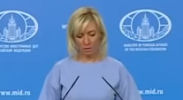 Recently Donald Trump accused Germany of being dangerously dependent on fuel imported from Russia. The Russian foreign minister has responded to this sally by pointing out that Germany is still occupied militarily by the United States Army. As for importing fuel from Russia, Germany has done so for over 50 years, reliably, without interruption due to political differences. Trump wants to sell fracked fuel from the US to Germany and other parts of Europe. Inside is a video with the Russian foreign minister's comment.
Recently Donald Trump accused Germany of being dangerously dependent on fuel imported from Russia. The Russian foreign minister has responded to this sally by pointing out that Germany is still occupied militarily by the United States Army. As for importing fuel from Russia, Germany has done so for over 50 years, reliably, without interruption due to political differences. Trump wants to sell fracked fuel from the US to Germany and other parts of Europe. Inside is a video with the Russian foreign minister's comment.
Bombing in Syria not the way to peace in Syria - Julie Bishop reckless
 Bombing not the answer for peace in Syria, rather a dangerous mistake - Independent and Peaceful Australia Network. Australian Foreign Minister Julie Bishop’s reckless support for a military strike by the US in Syria demonstrates Australia’s lack of independence in its foreign policy.
Bombing not the answer for peace in Syria, rather a dangerous mistake - Independent and Peaceful Australia Network. Australian Foreign Minister Julie Bishop’s reckless support for a military strike by the US in Syria demonstrates Australia’s lack of independence in its foreign policy.
IPAN spokesperson Mr Stephen Darley said, “Surely it is clear that any military exchange between Russian and US forces threatens a dangerous widening of the conflict and the lives of millions.
The Organisation for the Prohibition of Chemical Weapons has accepted an invitation from the Syrian government to inspect the region where an alleged chemical weapon attack occurred demonstrating a willingness to support its claim they had not conducted such an attack.
The video showing children being hosed down allegedly from a chemical weapons attack needs to be investigated. Any chemical attack is an inhumane and illegal act, requiring the strongest condemnation.
If there is proof that chemical weapons have been used in Syria, regardless of who was behind it, then there needs to be serious consequences in the international court of justice where crimes against humanity are legitimately dealt with.
What is clear is that a bombing assault on sites in Syria is neither legal, effective nor acceptable. The risks of even more innocent people suffering death, injury and destruction of homes and the risk that a major powers war could ensue is being recognised internationally.
Mr Darley is calling on the Foreign Minister and the Prime Minister to clearly reject the proposed missile attack and instead be a voice of reason in calling for all non-military means possible to be adopted to resolve the conflict.
This press release was issued two days before Mr Trumps attack of today.
WORLD WAR CRIME! Trump's strike on Syria threatens all of us with WW3 in name of 'God' based on false flag
 This is deliberate bombing of civilians. Damascus is the place in Syria where almost all refugees are and the bulk of the population. This is such a dreadful thing to do to the people of Syria. The leaders of the countries involved need to be captured and brought to trial by their peoples! We are all threatened by their actions. The whole world is unsafe with such people in power.
This is deliberate bombing of civilians. Damascus is the place in Syria where almost all refugees are and the bulk of the population. This is such a dreadful thing to do to the people of Syria. The leaders of the countries involved need to be captured and brought to trial by their peoples! We are all threatened by their actions. The whole world is unsafe with such people in power.
Grotesque and blatant lie: Trump has just announced in quite sickeningly misleading tones, his plan to strike Syria, a country that has courageously resisted to date all attempts to pull it apart. The United States is engaging in criminal war activities and is now bringing the world to the point of nuclear war. We all need to stand up against this monster US government. It is sickening to hear the utter confabulation about a this being a humanitarian or godly mission. The United States and its cohorts in NATO are outdoing Hitler. I will try to post updates under this heading.
At the moment RT in English is having its transmission interrupted or blocked in some way. I am getting Spanish Rt however and here is my translation of what it says at https://actualidad.rt.com/actualidad/268383-reportan-fuertes-explosiones-damasco-orden?utm_source=browser&utm_medium=push_notifications&utm_campaign=push_notifications:
Strong explosions being reported in Damascus now
"Strong explosions are being reported in Damascus following the order Trump gave to bombard Syria! 14 April 2018 01:19 GMT "
"https://es.rt.com/5r33 Portada Actualidad
Se reportan fuertes explosiones en Damasco tras la orden de Trump de bombardear Siria
Publicado: 14 abr 2018 01:19 GMT | Última actualización: 14 abr 2018 01:24 GMT
Las detonaciones y humo se reportaron muy cerca de la capital siria."
French and British have joined this war crime but alternative medias are being blocked
Please pass this on as widely as you can in case we lose the ability to communicate. There has been an attempt to hack my computer as I was writing this article.
Vanessa Beeley reports from Syria that Syria and Russia retaliating
11:34 AM Melbourne time:
"40 minutes of cruise missiles across Syria.
Syria and Russia responding."
First images of US-led strikes on Damascus emerge (PHOTOS, VIDEOS)
We have also heard that Syria just shot down 13 missiles over Damascus. (Press TV Iran.)
Damascus is the place in Syria where almost all refugees are and the bulk of the population. This is such a dreadful thing to do to the people of Syria. The leaders of the countries involved need to be captured and brought to trial by their peoples!
Video: Planned US-North Korea summit - Top interview w/former US diplomat
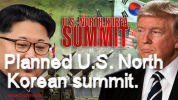
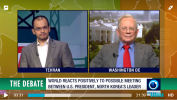 Press TV Iran produces superior, intellectual interviews and debates for the English language viewer and this interview is no exception. Waqar Rizvi interviews author and former US diplomat, Michael Springmann, from Washington, about the planned meeting between US president Donald Trump and North Korean leader Kim Jong-un. Springman has a wry sense of humour and a good feeling for comparative history, which sets him somewhat ahead of many Washington commentators. If you are interested in how Kim Jong-un and the US president came to be nose to nose, you will enjoy this. If you are really worried about nuclear holocaust, it might make some sense out of our predicament.
Press TV Iran produces superior, intellectual interviews and debates for the English language viewer and this interview is no exception. Waqar Rizvi interviews author and former US diplomat, Michael Springmann, from Washington, about the planned meeting between US president Donald Trump and North Korean leader Kim Jong-un. Springman has a wry sense of humour and a good feeling for comparative history, which sets him somewhat ahead of many Washington commentators. If you are interested in how Kim Jong-un and the US president came to be nose to nose, you will enjoy this. If you are really worried about nuclear holocaust, it might make some sense out of our predicament.
Video: Koreans talk peace - positive analysis by Crosstalk
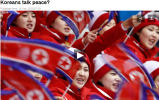
 The games have begun. The younger sister of North Korea’s ruler Kim Jong-un has captured the attention of the media, while US Vice President Mike Pence was mocked as a dud, even undiplomatic. The two Koreas are engaging each other. This makes the Washington foreign policy swamp fume. CrossTalking video with Brian Becker, Gregory Elich, and Myung-Koo Kang. This Crosstalk video pretty much covers the major bases in 30 minutes, with a stunningly well-informed cast.
The games have begun. The younger sister of North Korea’s ruler Kim Jong-un has captured the attention of the media, while US Vice President Mike Pence was mocked as a dud, even undiplomatic. The two Koreas are engaging each other. This makes the Washington foreign policy swamp fume. CrossTalking video with Brian Becker, Gregory Elich, and Myung-Koo Kang. This Crosstalk video pretty much covers the major bases in 30 minutes, with a stunningly well-informed cast.
How to end the Korea Crisis - Ron Paul and Alex Jones
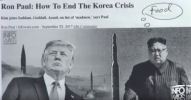 This is a great interview because it voices the kinds of anxieties many people feel in reaction to the crazy analysis we are being presented with by the mainstream media vis a vis North Korea and the United States, but it brings some common sense to the matter in the form of Senator/Dr Ron Paul. Alex Jones, head of Infowars dot com is an interesting and flamboyant product of US capitalism, religion, and the education system. Loyal to Trump, but spooked, he wants to see something positive in Trump's posturing against North Korea. Senator Ron Paul is an American author, physician, and former politician, with an excellent historic and current grasp on foreign affairs, who finds war a dangerous and stupid creation of the deep state. And he talks from experience. In this interview, Senator Ron Paul points out that Alex has been falling for the neocon propaganda where the US always goes to war to 'defend' nations from 'mad dictators'. Of course the nations finish up almost destroyed by the US, worse off than before, and, you have to wonder why the neocons get away with the same cartoon-like frame up of leaders who have territory that they want. Ron Paul points out Alex Jones dancing to the neocon tune on North Korea, "Alex, you've swallowed the neocon line!" Alex entertains with his typically grotesque, original, and dramatic rhetoric, such as, "Horrible little communist third-generation dictator, fat off the blood of his little skinny citizens." As he interviews Ron Paul, Alex draws a cartoon of plump Kim Jong un approaching Donald Trump with a thought bubble, "Food!" It somehow reminded me of how Trump talked about missiles and chocolate cake in the same mouthful not so long ago regarding another 'mad dictator' (there are so many, apparently).
This is a great interview because it voices the kinds of anxieties many people feel in reaction to the crazy analysis we are being presented with by the mainstream media vis a vis North Korea and the United States, but it brings some common sense to the matter in the form of Senator/Dr Ron Paul. Alex Jones, head of Infowars dot com is an interesting and flamboyant product of US capitalism, religion, and the education system. Loyal to Trump, but spooked, he wants to see something positive in Trump's posturing against North Korea. Senator Ron Paul is an American author, physician, and former politician, with an excellent historic and current grasp on foreign affairs, who finds war a dangerous and stupid creation of the deep state. And he talks from experience. In this interview, Senator Ron Paul points out that Alex has been falling for the neocon propaganda where the US always goes to war to 'defend' nations from 'mad dictators'. Of course the nations finish up almost destroyed by the US, worse off than before, and, you have to wonder why the neocons get away with the same cartoon-like frame up of leaders who have territory that they want. Ron Paul points out Alex Jones dancing to the neocon tune on North Korea, "Alex, you've swallowed the neocon line!" Alex entertains with his typically grotesque, original, and dramatic rhetoric, such as, "Horrible little communist third-generation dictator, fat off the blood of his little skinny citizens." As he interviews Ron Paul, Alex draws a cartoon of plump Kim Jong un approaching Donald Trump with a thought bubble, "Food!" It somehow reminded me of how Trump talked about missiles and chocolate cake in the same mouthful not so long ago regarding another 'mad dictator' (there are so many, apparently).
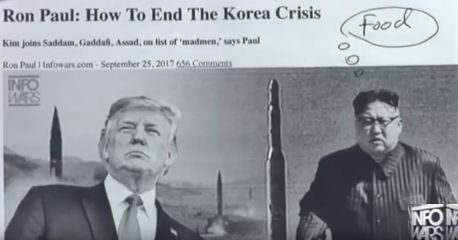
The following contains excerpts from the interview, which is just under 20 minutes long:
RON PAUL: We've been there way too long and you know this whole idea this stage is set now that you know the Koreans are threatening what we might shoot down an airplane well what if there's now that that stage is said it's progressing because of our involvement somebody's going to use a false flag and somebody's going to shoot down the airplane just so that this war gets started so that's why I believe in non intervention we ought to defend this country but it's time to come home from Korea you've lost too many lives we killed even when we got involved in that war you know with the north and the south we bombed the north to smithereens we killed 30 percent of their population and they had never attacked us we never declared war we went there under UN banner we have an insane foreign policy and unfortunately it really hasn't changed that much with our new president.
Alex: [...] But what happens if China or Russia gets involved Dr Paul?
RON PAUL: Well, they will get involved. [...] When it started way back in the 50s, we thought, well, we'll take care of this and a month after the war broke out. You know, we essentially won the war and then we moved up and [..] said well we'll occupy North Korea. Went up to the border and then the Chinese came in. True they're going to be involved, but I think you just made the case for why we need to be out of there! Because you know the North Korea guy is goofy, but I'll tell you what, he does know what he's doing, because he has to threaten because he believes that if he gives up and capitulates, does exactly what we tell him to do, what will happen [will be]like what happened to Saddam Hussein and what happened to Qaddafi. And you know how we treat Assad in Syria.
We have an empire to defend, we run the world, and it's wrong. It doesn't work. Millions of people have died over this. And it's time we as a people woke up and say we ought to mind our own business. We ought to come home and defend this country. We don't need to be worrying about battleships and bombers and flying back and showing that we have strengths. Their weapons were used in world war II.
And this guy who runs North Korea, he's not going to invade the United States. He's not going to launch a missile. Just remember the whole thing dealing with Iraq about all the danger, great danger.
Deep State propaganda blames other countries to start wars
The propagandist, the deep state, the media, convinced the American people that Saddam Hussein was a danger. They're doing the same thing now with North Korea! And that's why we ought to wise up and just not buy into this and and look at this as a constitutional issue. And not to say, well we need to go to war with this guy. Unfortunately we're marching that way, but we better look at ourselves too and why are we involved in a hundred and twenty different countries with our military personnel and why are we always looking for trouble.
And I would say that it's very very dangerous, but just to say, well it was always Saddam Hussein's fault; it was always Qaddafi's fault; it's always Assad's fault. And then turn around and say, oh yeah, look at Russia look at what they're going to do.
I mean, it is the neocon foreign policy that we have been following. We still follow a neocon foreign policy. I think that's tragic.
Jones: "Horrible little communist third generation dictator, fat off the blood of his little skinny citizens"
ALEX JONES: That said, I agree with you in practice and function, but even people like Joel Skousen that was agreed with you about not having a war you know in the last five or six saying they were frauds, he says when you get down to North Korea now, they do have nuclear weapons, they are being backed by China, they are a real threat, they are firing missiles right over Japan. They can test weapons but but but doing it in this way, threatening preemptively to blow up the US;to say it's inevitable - that's pointing a gun at us and really next-level Bravada! It's incredible chicken! And then you have the Clintons, as you know, transferring the reactors, transferring the missiles in the mid-90s, that you and others criticized when you first got back into Congress. And so there's a lot of blame going around here, and then you just have the horrible little communists third generation dictator, fat off the blood of his little skinny citizens - I agree with you, the poor Koreans, North Korean slaves and their children - I feel sorry for them. I don't want to have to you know nuke the DMZ. But if they do strike us first, I think they may be crazy enough to do it, then it's going to take a major commitment to make sure they can't count on a response. Dr. Paul?
Alex, you're buying into neocon garbage
RON PAUL: I ... You're buying into all the garbage that's passed out there by the deep state and neoconservatives and and the media. My suggestion, very clearly, on what we should do is we should allow the South Koreans to talk to the North Koreans. What's wrong with that? They're the ones that have everything at stake and we don't even allow them to do that. And and yet they were willing to! Just last week, the South Koreans, in an effort to break this conflict, they sent a couple million dollars to North Korea to take care of some of the people, the kids that are suffering from our sanctions. The people suffer. We killed people. We killed almost a million Iraqis with our sanctions before we went to war. And all these sanctions do is just provoke the bitterness! [...] Why do we prohibit the South Koreans from talking to the North Korea?"
ALEX JONES: [...] Sure, sure, I mean it's like Madeline Albright said, 'A half million Iraqi children is a good price to pay with the sanctions.' It's probably way over a million. The Lancet British medical journals it was like 1.3 back in like 2007 going back to 1990 and, understand, Dr. Paul I'm just wargaming both sides of the debate I've not bought in to the garbage that we need to have a war or that sanctions are always the best thing. As you said, Vietnam now loves us hates communist China, becoming a free-market powerhouse. And we should have made a deal with Ho Chi Minh to go in there and be free market to begin with but we double-crossed him tried to overthrow him as you know back in ... so I understand the history of it as you do, as a former Air Force officer.
The only thing I'm getting at here is is that we can certainly recognize communist regimes are also horrible evils. Just because we have neocon problems here, I mean certainly this is a great example of how communism is a horrible nightmare like Venezuela.
Let North & South Korea talk; let Russia and China negotiate; This isn't US territory
RON PAUL: Well I still think that you're seeing them as a much greater threat [than they are] and when I was drafted in 1962 of the Cuban crisis, you know there was a real hot cold war going on at the time. But we had danger then. The Soviets had 30,000 nuclear missiles and weapons, but we didn't provoke or think we had to get rid of them! We actually dealt with them and Kennedy talked to them and got rid of that crisis we had in Cuba. North Korea, they don't have this capability. China is not interested and it's not in their interest to allow this guy to provoke and get into a war with us. That isn't quite accurate to say that they're in cahoots with China, that they have nuclear bombs and and all this sort of thing.
I think that we should allow South Korea to start having negotiations. Let's let China and Russia [...] they should be more involved in this. Let them monitor the standpoint. But why are we, six, seven thousand miles away? Once again we've been involved in a civil war that's been going on endlessly. It's time we stopped it.
Alex: But what about the evil dictators?
ALEX JONES: Let's be clear, I agree with you. I have four children you've got a bunch of children. You've got a bunch of grandchildren and great-grandchildren, I'm told now. And I absolutely do not want to have a nuclear war. I do not want this to happen. I understand that what you're saying is historically true. I'm simply pointing out that President Trump has been right on so many other issues and I understand that it looks like there's been an escalation. He believes that the strategic appeasement, the strategic patience, has run out and [...] he's looking for some other way to get North Korea to come to the bargaining table. Hell! Months ago, Rex Tillerson was saying let's have talks, stop this rhetoric, and it only seemed to encourage Kim Jong-un. So I understand you can say we're ganging up on North Korea and the people hurt are the poor folks in it. That's true. I'm not saying you're wrong, but what about the dictators? What about the horrible evil leaders of the nation? What are we supposed to do about them? What do we do?
Alex,that's the neoconservative line again
RON PAUL: Alex you're speaking for the neoconservatives! That's their line of talking why we have to do this. And I'm just arguing it's totally unnecessary. [It] didn't work - you admit it didn't work in Vietnam and we should have done that differently. And we're friends with them. We win more in peace than we do in war. But we've been in Korea! This whole thing is just based on a lot of misconceptions. I think our administration has accepted neocon lies and they're going with it but they're agreeing to trouble because of the diplomacy [JONES talks over Ron Paul]
ALEX JONES: And I agree with you. [...]What is your advice to President Trump? What is your advice to the president?
Advice to President Trump: Get out of interventionism. We're acting like insecure bullies
RON PAUL: Bring the troops home! I would advise him just what my position has been for years. Get out of interventionism! Bring the troops home. Get out of all this. Get out of Syria, out of Iraq, the whole works! Start dismantling our empire. Get all our troops out of Korea and allow people to settle their own disputes. But not to join this neocon effort to continue to run the world and distort the truth, because they love the wars in the Middle East. And now the neocons are behind all this activity, [the're] why we have this great enemy of the North Koreans. I think when we get so upset about that, that we're insecure. We act like a bunch of bullies. We're insecure, we don't know how to react, and say, 'Oh they're coming! They're gonna cut us, then they're gonna bomb us!' Alex, that is not true and the Chinese aren't on that side of that issue at all. They're are holding him back, if nothing else, because they have too much to lose. They don't want any more war in North Korea than we do. So I don't really think it's right to say this guy in North Korea is going to because he's aligned with the Chinese, that they're going to help him provoke a war with the United States.
ALEX JONES: Just to be clear, their main trading partner is the Chinese. I'd love to see the two countries unified in this nightmare and I'm not going with that line I'm looking at both the lines of reasoning here just to play devil's advocate I overall agree with you and hope that's the way this goes but they do say they have hydrogen bombs. It is believed they have them. They're saying they're preemptively using them, so they're putting out horrible rhetoric as well. I get your point that they need to look strong; they saw what happened to Iraq and other countries that didn't have nuclear weapons. They look at you know Iran looks at that so so moving away from that is that we actually agree on that subject and I pray everything turns out alright they've got your article posted on info wars.com promoting that. [...]
The US proxy war on China via North Korea
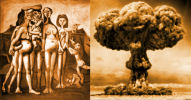 Since 1945 the Korean people have been at war. Shortly after the establishment by anti-Japanese resistance fighters of the Korean People's Republic that was to become the government of North Korea, in Seoul, the US has been at war with North Korea both technically and in reality. The most bloody chapter in that war was the three year war between 1950 and 1953. In this war, approximately 20% of the population of North Korea perished in fighting under aerial bombardment, through biological warfare and flooding. Many hundreds of thousands of their allies in the South also perished at the hands of the American occupiers and their south Korean puppets. The Korean Peninsula was divided up between the United States and Russia after the defeat of the Japanese. Under President Roosevelt the arrangement might have been temporary, but President Truman's cold war politics furthered the desires of military-industrial-complex's ambition to enforce capitalism on the whole world and the Korean War was a part of this.
Since 1945 the Korean people have been at war. Shortly after the establishment by anti-Japanese resistance fighters of the Korean People's Republic that was to become the government of North Korea, in Seoul, the US has been at war with North Korea both technically and in reality. The most bloody chapter in that war was the three year war between 1950 and 1953. In this war, approximately 20% of the population of North Korea perished in fighting under aerial bombardment, through biological warfare and flooding. Many hundreds of thousands of their allies in the South also perished at the hands of the American occupiers and their south Korean puppets. The Korean Peninsula was divided up between the United States and Russia after the defeat of the Japanese. Under President Roosevelt the arrangement might have been temporary, but President Truman's cold war politics furthered the desires of military-industrial-complex's ambition to enforce capitalism on the whole world and the Korean War was a part of this.
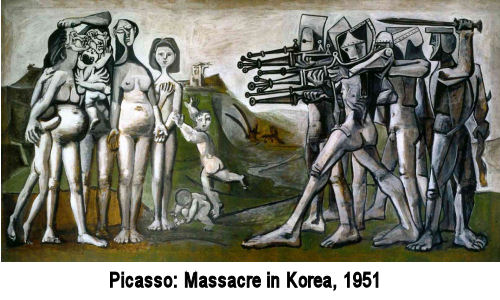
Back to the future
It's back to the 1960s. In 1962 with the Cuban Missile Crisis, children learned that they might be snuffed out at any time. The assassination in November 22, 1963, of President John F Kennedy, who prevented the threatened atomic war with Russia over Cuba, seemed to make this clearer.
Someone we knew who was 11 when Kennedy was assassinated, suicided in their late 20s because they had never recovered from despair at the prospect of the nuclear holocaust destroying all the forests and creatures in the world, along with the species that had unleashed this insanity.
But the first and the last nuclear attack on a country for war purposes was when America bombed Hiroshima in August 1945, although many 'tests' have since been conducted. (See Arms Control Org's nuclear test tally.)
So we had begun to relax. ...
Until August 7th, 2017, when President Trump lashed out at Kim Jong-un, leader of North Korea, promising "fire and fury" if North Korea persisted with its nuclear program. North Korea has been conducting nuclear tests since 1990 (See again Arms Control Org's nuclear test tally.)
President Trump presented no reflection about North Korea's motivation to acquire these nuclear weapons. In that sense, if you knew the story, it was like hearing a drunk threaten to punch his wife if she tried to protect herself.
David and Goliath
Trump is sitting on top of a mountain of nuclear warheads and the US has armadas of warships constantly patrolling Korean waters in a threatening fashion. That is what Kim Jong-un is responding to; the current US military presence and the past record of occupation and war by the same presence. North Korea does not have ships patrolling US waters.
A few years ago the United States threatened to annihilate Libya if Gaddafi did not give up defending the state against rebel attacks. He insisted that he had complied, but the United States financed people to go in and assassinate him and tear his country to pieces anyway. (See "Book Review: Destroying Libya and World Order by Francis A. Boyle")
Basically, the United States invades any country it wants to, unless that country has nuclear weapons. It has done this on similar pretexts already to Afghanistan, Iraq, Libya, Syria and constantly threatens Iran. It would do it to Russia if Russia had no nuclear weapons. Indeed it has Russia quasi surrounded by US military bases, many situated in Europe in countries where the local populations may not want them. The United States has "800 military bases in more than 70 countries and territories abroad," yet it pretends that Russia, which has ten foreign military bases, close to its own borders, is the one bent on military expansion. China has one military base in Djibouti and several in process in the Pacific on artificially augmented islands.
History of US attempts to stop the nuclear arms race
When President John Kennedy stopped nuclear war on Russia via Cuba, President Kruschev and he talked on the phone and began a nuclear weapons disarmament program in 1963. See https://www.jfklibrary.org/JFK/JFK-in-History/Nuclear-Test-Ban-Treaty.aspx. In 1996, 71 nations, including those possessing nuclear weapons, signed the Comprehensive Nuclear Test Ban Treaty, which prohibited all nuclear test explosions including those conducted underground. Though it was signed by President Bill Clinton, the Senate rejected the treaty by a vote of 51 to 48. With the dissolution of the Soviet Union in 1991 much of the impetus for a nuclear program seemed to disappear. Perhaps the United States really thought that Russia was going to become a subservient client state, like Australia, but Russia has its own history and traditions. It has not gone back to communism, but it does not seek the same kind of free-market regime as America and does not want NATO on its borders.
The United States does not appear to accept this political and economic independence in Russia or China or, indeed, in any state. Hence their ramping up of nuclear threat when people hoped it was reducing. Now, today's young people must live in that terrible shadow of nuclear holocaust again, and some will lose hope.
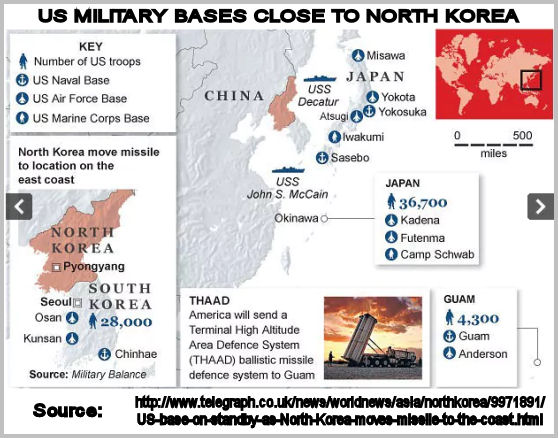
US role in Korean war and massive loss of Korean life
North Korea has been under siege for about 72 years since the Japanese colony of the Korean Peninsula was divided in two between Soviet and American occupation forces after Japan surrendered in 1945. In August 1948 the Republic of Korea was established in the south with Syngman Rhee as President. In September 1948 the Democratic People's Republic of Korea was established with Kim Il-sung as Premier. In 1949 Kim Gu, a Korean independence activist who wanted a unified Korea was shot in his home by a South Korean Army lieutenant.
The United States say that North Korea invaded South Korea and so the United States went to war against North Korea. North Korea says the war started when the South launched an attack against the North and so the North counter-attacked. But that in itself is not the critical issue. The critical issue is that sovereignty in the south was violated by the US occupation and thousands, maybe tens of thousands of supporters of the 'North' Korean government were murdered and jailed by the South Korean government with the help of the Americans.
Something like 20% of North Koreans died in the subsequent war. They were victims of America's massively disproportionate firepower. America only agreed to a truce because China and North Korea were able to resist with their own firepower until US loss of lives (much fewer than those of North Korean soldiers) became unpopular in America. Australians also participated in this war and at one stage Australian warfies blackbanned supplies to the Australian armed forces.
Understandably North Korea sees the continuing presence of US military armadas for the threat that they are, along with annual US military 'exercises' on South Korean soil.
North Korea forms a buffer for China
As John Pilger explains in his Coming war on China the US threats against North Korea may also be interpreted as threats against China. The United States is demanding that China take military action against North Korea if North Korea fails to disarm its nuclear program. But North Korea is useful for China by providing a bullwark against US aggression. And Russia and China share a defensive attitude to US expansionism.
Meanwhile just about every US ally (or are we US hostages?) mass media and much of the supposed alternative newsmedia, including Infowars, Hannity and Tucker Carlson, is reporting all this as Trump portrays it, vis, that North Korea is insane and threatening America with no reason at all.
No, Kim Jong-un does have a reason.
If America does not lead nuclear disarmament and stop its expansionism, which is what Trump led people to believe he would do, then who can lead it?
What Are We To Believe? Fake news plus phony “intelligence” equal disaster - Article by Justin Raimondo
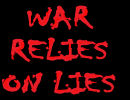 The Washington Post has published a story claiming that the North Korean regime of Kim Jong Un has succeeded in miniaturizing a nuclear warhead small enough to fit onto an intercontinental ballistic missile. It’s another “leak” coming from an intelligence community that seemingly does little these days but leak like a sieve. Which raises the question: Should we believe them? [This article by Justin Raimondo was first published at original.antiwar.com/justin/2017/08/10/what-are-we-to-believe/ on August 11, 2017.]
The Washington Post has published a story claiming that the North Korean regime of Kim Jong Un has succeeded in miniaturizing a nuclear warhead small enough to fit onto an intercontinental ballistic missile. It’s another “leak” coming from an intelligence community that seemingly does little these days but leak like a sieve. Which raises the question: Should we believe them? [This article by Justin Raimondo was first published at original.antiwar.com/justin/2017/08/10/what-are-we-to-believe/ on August 11, 2017.]
What we are dealing with is a national security bureaucracy that is not only highly politicized – that’s not really anything new – but is also engaged in an extended campaign to accomplish specific political objectives. The leaks coming out of Washington have had a clear political purpose – to a) discredit President Donald Trump, and b) push us closer to some sort of conflict on the
international stage. And of course the two are not mutually exclusive: indeed, they are congruent. For a war on the Korean peninsula, for example, would define – and, I would submit, discredit – Trump’s presidency, as many thousands would die in a conflagration of unimaginable horror.
The Post quotes a single sentence of a Defense Intelligence Agency assessment dated July 28:
“The IC [intelligence community] assesses North Korea has produced nuclear weapons for ballistic missile delivery, to include delivery by ICBM-class missiles.”
That’s it: that’s the whole thing. The Post hasn’t actually seen the document: it was read to reporters by the leaker. Oh, and “Two U.S. officials familiar with the assessment verified its broad conclusions.”
What “broad conclusions”? The conclusions drawn by this article aren’t in the least bit broad, but are instead quite specific. Are they true? We just don’t know, and, what’s more, we cannot know. Indeed, we know almost nothing about this alleged “assessment.” We don’t know the identity of the leakers. We don’t know their motives. Based on the sparse information we have, we cannot evaluate the veracity of this latest “revelation,” and this is doubly true not only due to the laconic nature of the reporting, but also because of the journalistic context in which it appears.
To begin with, this story is nothing new. Back
in 2013, Rep. Doug Lamborn (R-Colorado) blurted out the DIA’s assessment on Capitol Hill:
“Three hours into a hearing of the House Armed Services Committee, Lamborn said the Defense Intelligence Agency, which is under the Pentagon, determined with ‘moderate confidence’ that North Korea has the capability to make a nuclear weapon small enough to be launched with a ballistic missile.
“The Colorado Springs Republican gleaned the information from the conclusion of a classified report, though that sentence was unclassified, said his spokeswoman Catherine Mortensen.
“Pentagon officials told The New York Times that the information had previously not been released publicly.
“Pentagon spokesman George Little issued a statement after the hearing, saying ‘it would be inaccurate to suggest that the North Korean regime has fully tested, developed, or demonstrated the kinds of nuclear capabilities referenced in the passage.’”
The Post is telling us the DIA assessment is fresh off the presses, finished as late as “last month” – not so! Whether the Post is being deluded by its sources, or is trying to delude us in collaboration with its sources, is up for debate.
Which brings us to another problem, not only with this story but with all the “news” we’re getting from the mainstream media these days: reporters have become as politicized as their sources in the intelligence community. The Obama holdovers in the national security Establishment are not alone in their campaign to discredit the President. The media have been complicit
all along: indeed, the legacy media’s journalists have been eagerly cheerleading the Russia-gate witch-hunt, and openly proclaiming their hostility to this administration. This is in addition to their traditional role as the War Party’s journalistic camarilla.
While this particular story is not directly linked to Russia-gate, or the President’s political fortunes, what it comes down to is that neither the sources of this story nor those who are reporting
it can be trusted. It could be true that the North Koreans have developed the capability of miniaturizing nuclear warheads, but we just don’t know. The observant reader is left in a fog – the fog of an information war in which journalism is not a means of discovering knowledge, but a weapon to be deployed in a political-ideological conflict.
If the media is on a war footing, wielding the battle-cry “democracy dies in darkness,” then today the truth is tangential – because a few untruths may be necessary in the fight to push back against the “darkness.”
People complain that there’s too much news, that the sheer volume is overwhelming, and disorienting, but in reality we’re living in a news vacuum because we don’t know what’s true anymore. All standards have been thrown out: sure, the mainstream media was never really objective, but now even that pretext has been abandoned.
If we liken the function of the media in a free society to the function of our eyes and ears, then we have, in effect, been struck blind and rendered deaf. Although actually it’s far worse than that: rather than conveying information about the real world, the mainstream media is giving us a highly distorted version of events –in many cases, a Bizarro World inversion of what is actually occurring.
All this is bad enough, but we must take it one step further. If the media is the eyes and ears of the public then the intelligence agencies and the national security bureaucracy of which they are a part are Uncle Sam’s sensory organs. The price to be paid for the politicization and corruption of the intelligence community is that US policymakers are operating in the dark – where not only democracy dies, but also any sort of rational decision-making. In which case Uncle Sam is a blinded Titan, deaf to the entreaties of those he unknowingly tramples underfoot, stumbling this way and that – with the very strong possibility of ending up at the bottom of a cliff.
This epistemological disability brings to mind two citations, one from the run-up to the Iraq war and one more recent. The former is the famous “reality-based community” quote reported by Ron Suskind in the course of an interview with a top aide in George W. Bush’s White House:
“The aide said that guys like me were ‘in what we call the reality-based community,’ which he defined as people who ‘believe that solutions emerge from your judicious study of discernible reality.’ … ‘That’s not the way the world really works anymore,’ he continued. ‘We’re an empire now, and when we act, we create our own reality. And while you’re studying that reality – judiciously, as you will – we’ll act again, creating other new realities, which you can study too, and that’s how things will sort out. We’re history’s actors…and you, all of you, will be left to just study what we do.’"
Suskind wasn’t reporting anything all that unusual: this is how our political class thinks. After all, they create the political reality in which the rest of us are forced to live. Yet there is a point beyond which this kind of hubris becomes dangerous – and suicidal. Encased in a bubble, the Beltway elites never saw the victory of Trumpism coming – and that failure may be just the beginning of their undoing (and our own). For as Vladimir Putin put it to Oliver Stone:
“I think that when the United States felt they were at the forefront of the so-called civilized world and when the Soviet Union collapsed, they were under the illusion that the United States was capable of everything and they could act with impunity. And that’s always a trap, because in this situation, a person and a country begins to commit mistakes. There is no need to analyze the situation. No need to think about the consequences. No need to economize. And the country becomes inefficient and one mistake follows another. And I think that’s the trap the United States has found itself in.”
A person who cannot distinguish fantasy from reality is clinically insane, or perhaps senile. What do we call an entire society so afflicted?
White House Appears to Be Planning Attack on Assad - Article by Jason Ditz
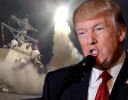 Press Statement Lays Groundwork for US Attack. Raising speculation that the US is about to attack Syria again, the White House has issued a statement late this evening accusing the Assad government in Syria of conducting “potential preparations for another chemical weapons attack,” claiming that such an attack would involve the “mass murder of civilians, including innocent children.”
Press Statement Lays Groundwork for US Attack. Raising speculation that the US is about to attack Syria again, the White House has issued a statement late this evening accusing the Assad government in Syria of conducting “potential preparations for another chemical weapons attack,” claiming that such an attack would involve the “mass murder of civilians, including innocent children.”
Press Statement Lays Groundwork for US Attack. Raising speculation that the US is about to attack Syria again, the White House has issued a statement late this evening accusing the Assad government in Syria of conducting “potential preparations for another chemical weapons attack,” claiming that such an attack would involve the “mass murder of civilians, including innocent children.”
Original article by Jason Ditz published at news.antiwar.com/2017/06/26/white-house-appears-to-be-planning-attack-on-assad/
Posted on June 26, 2017 (Note that some links here will only work if you drop the 's' from the https preceding the URL, but we add the 's' here due to arbitrary browser protocol.)
The late night report was extremely light on details, but threatened to make Syria’s government and military “pay a heavy price,” suggesting that the statement was only issued to lay the groundwork for a new round of US attacks on Syrian government targets.
The US last attacked Syria in earnest in early April, firing 49 cruise missiles at a Syrian air base. The attack was carried out despite reports ultimately showing that the US intelligence community found no evidence a chemical weapon attack took place.
The White House statement ignored that revelation, and presented the early April incident as a “chemical weapons attack” just like the one they believe to be imminent. Since the administration is very keen to present what they did in April as justified, it would not be surprising if they did so again.
Such a move would be particularly risky now, coming amid Russian warnings that the US needs to stop attacking Syrian government targets. It also comes just hours after Secretary of State Rex Tillerson spoke with Russia’s Foreign Minister about a ceasefire, which seems a particularly inopportune time to attack.
CrossTalk: Saudi Arabia vs Qatar
 The regional and international standoff headed by Saudi Arabia against Qatar is not going to be resolved anytime soon. What does the simmering crisis mean? And why has Donald Trump taken the Saudi side? CrossTalking with Sharmine Narwani, Mohammed Cherkaoui, and Foad Izadi.
The regional and international standoff headed by Saudi Arabia against Qatar is not going to be resolved anytime soon. What does the simmering crisis mean? And why has Donald Trump taken the Saudi side? CrossTalking with Sharmine Narwani, Mohammed Cherkaoui, and Foad Izadi.
International Law Prof. Francis Boyle on Trump impeachment on US activity in Syria
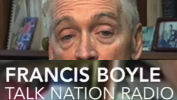 The Democrats and Soros-backed groups are desperately looking to impeach Trump. The US activities in Syria offer the perfect opportunity, but of course Trump's enemies won't pursue it because they are right behind the US-NATO war crimes in Syria. It is ironic that, when Trump is really doing bad illegal stuff, he is also doing the will of the Democrats. This would be because the external policies of both political parties are driven by the Deep State. A further complication is that, if Trump could be impeached, then all those behind the illegal war on Syria would also be in danger of pursuit under criminal law. Automatic transcript provided.
The Democrats and Soros-backed groups are desperately looking to impeach Trump. The US activities in Syria offer the perfect opportunity, but of course Trump's enemies won't pursue it because they are right behind the US-NATO war crimes in Syria. It is ironic that, when Trump is really doing bad illegal stuff, he is also doing the will of the Democrats. This would be because the external policies of both political parties are driven by the Deep State. A further complication is that, if Trump could be impeached, then all those behind the illegal war on Syria would also be in danger of pursuit under criminal law. Automatic transcript provided.
Automatic transcript
Below is a cut and paste of Youtube's automatic transcript of the speech, which may contain errors, notably based on machine spellings of sounds. Emboldened emphases are by Editor of candobetter.net.
[Music]
0:01 welcome to talk nation radio a half-hour
0:04 discussion of politics as if the people
0:07 mattered
0:08 I'm David Swanson it is my great
0:10 pleasure to welcome to talk nation radio
0:13 this week Francis Boyle Francis Boyle is
0:15 a professor of international law at the
0:17 University of Illinois College of Law he
0:20 has served as counsel to Bosnia and
0:22 Herzegovina and to the provisional
0:24 government of the Palestinian Authority
0:25 he has represented the Blackfoot nation
0:28 the nation of Hawaii the Lakota Nation
0:30 he drafted the US domestic implementing
0:33 legislation for the biological weapons
0:36 convention known as the biological
0:37 weapons anti-terrorism Act of 1989 and
0:41 he has been a strong advocate over the
0:43 years for the proper use of the power of
0:45 impeachment Francis Boyle welcome to
0:49 talk nation radio well thank you very
0:52 much for having me on David my best to
0:54 your listening audience very glad to
0:56 have you on should Donald Trump be
0:59 impeached well I've taken the position
1:05 certainly that his attacks on Syria
1:09 clearly violate the War Powers Clause of
1:14 the United States Constitution the War
1:17 Powers Resolution of 1973 and the United
1:22 Nations Charter they would constitute
1:26 crimes against peace as recognized by US
1:31 Army Field Manual 27:10 so certainly in
1:35 my opinion those are impeachable
1:38 offenses for sure is there a reason you
1:41 named Syria in particular as opposed to
1:44 Afghanistan or Iraq or Yemen or you know
1:47 other places where Donald Trump has
1:50 dropped bombs no I just think that you
1:54 know that clear the serious situation is
1:57 is a clear-cut case for impeachment I
2:01 guess the rest weed we have to talk
2:04 about that the press release we put out
2:08 was prompted by Trump
2:13 to latest attacks on Syria yoga it seems
2:19 that there's a view that if the latest
2:22 attack was on Syrian forces as opposed
2:25 to some other forces in Syria then that
2:28 makes a difference but it seems to me
2:31 the the list of violations you went
2:34 through the UN Charter etc covers
2:37 killing anybody in Syria or for that
2:39 matter Afghanistan or Iraq or anywhere
2:42 else that the United States is illegally
2:44 killing people well David I you know I'm
2:49 a law professor I just have to be
2:52 precise in my analysis when we're
2:54 dealing with each of one of these
2:55 countries but certainly when it comes to
2:59 Syria the United States government has
3:02 no right to be in Syria at all and as
3:05 you know we have military forces up
3:08 there and Raqqa we're bombing up there
3:11 we also have military forces in Syria
3:15 itself near the border with Jordan those
3:19 are the ones who are fired
3:21 this time arm so our whole presence in
3:25 Syria is is completely illegal unlawful
3:30 unconstitutional it's never been
3:32 approved by our Congress and so
3:34 definitely that's that's impeachable for
3:37 sure from my perspective we you know we
3:42 can talk about other countries if you
3:43 want to but you know I I have to be
3:47 precise I just can't lump everything
3:50 together in you know in one bucket
3:54 absolutely well I would be delighted to
3:57 simply impeach Trump for Syria I was
3:59 just trying to grasp what the
4:00 distinction is between Syria and say
4:03 Afghanistan because it seems that
4:05 Congress allows both to go on provides
4:08 the funding that is used for both the UN
4:11 Charter covers neither etc so I am just
4:15 you know looking for what's the what's
4:17 the legal distinction between the two
4:20 well again right now I just you know I
4:22 want to talk about Syria if you want to
4:24 talk about other countries we can
4:27 and in in terms a you know I've seen
4:32 also references to the fact that Donald
4:36 Trump apparently owned stock in hidden
4:38 raytheon you know in the missiles that
4: sends into Syria is that sort of
4:43 corruption make it make it any worse or
4:45 any more of an impeachable offense or is
4:47 it is the attack on Syria enough well
4:52 that's why I'm arguing the attack on
4:54 Syria's enough I I think you know if you
4:57 look at other potential articles of
5:00 impeachment and I've been this through
5:03 this before I was counsel to the late
5:07 great Henry B Gonzales on his bill of
5:11 impeachment against Bush senior for the
5:14 Gulf War and Ramsey Clark and Gonzales
5:17 and I set up a national campaign to
5:19 impeach bush senior for that war on and
5:22 when when the war started congressman
5:25 Gonzales introduced his bill of
5:27 impeachment and in his memoirs Bush
5:30 senior did state that the reason he
5:33 stopped at Basra and did not go all the
5:36 way to Baghdad was that he feared
5:37 impeachment so we did have have an
5:40 impact there unfortunately couldn't stop
5:44 that war but right now uh you know I'm
5:49 certainly prepared to say that the
5:51 Trump's attacks on Syria are impeachable
5:54 offenses for sure it's it's a slam-dunk
5:57 to use that phrase a type of situation
6:02 yeah right there I could I could draw
6:04 those that article of impeachment now if
6:07 a member of Congress wanted to see it as
6:11 I recall a you and Ramsey Clark also
6:14 presented a case for the impeachment of
6:17 Bush jr. to the Democrats in Congress
6:20 just a week or so before the the attack
6:25 on Baghdad you know which could
6:27 conceivably have saved over a million
6:30 lives and the Congress members there as
6:33 I recall from your account of it
6:37 accepted the the logic of the of the
6:40 case but decided it would be better for
6:42 the Democrats to wait until the next
6:45 election and be able to campaign against
6:48 the war is that what happened basically
6:52 yes David what happened is just before
6:57 the start of go for two by Bush jr.
7:00 Congressman John Conyers the ranking
7:05 member of the House Judiciary Committee
7:06 that had jurisdiction over bills of
7:09 impeachment invited me and Ramsey Clark
7:13 to come in and argue the case for
7:15 impeachment
7:16 uh before 40 or so of the top lawyers
7:22 affiliated with the Democratic Party and
7:26 he had a draft bill of impeachment there
7:30 uh by me drafted by me you can find it
7:33 on the internet if you want to look for
7:35 arm and Ramsey had one too that was was
7:39 similar to mine so Ramsey and I it was a
7:43 two hour debate
7:44 almost everyone there were were lawyers
7:46 of Ramsey and I both both argued the
7:50 case for impeachment and what happened
7:55 the the decisive factor was that John
7:59 Podesta appeared and no Podesta is
8:03 Hillary Clinton's presidential campaign
8:06 director or was and he said that he was
8:12 appearing there on behalf of the
8:15 Democratic National Committee and the
8:18 Democratic National Committee did not
8:22 want a bill of impeachment put in
8:24 against Bush I also had one for Cheney
8:27 and Ashcroft so you know what can I say
8:33 it's clear the Democrats uh were in on
8:38 this war I mean that debt really put the
8:40 kibosh on on the whole thing whatever
8:43 they say in in public
8:45 I'm not criticizing congressman not
8:47 Conyers of course if you you know if he
8:49 he
8:50 had booked the will of the DNC probably
8:53 would have been stripped of his
8:55 seniority and everything else I know his
8:58 heart was in the right place uh you know
9:01 but he's a team player and so we never
9:05 put put put the bill of impeachment in I
9:08 regret to say it was one of the great
9:10 disappointments of my life certainly uh
9:13 and all those people you know the the
9:16 estimate is maybe 1.5 million Iraqis
9:20 were exterminated in what could only be
9:23 called a war of outright genocide
9:25 against the Iraqis and it still
9:28 continues today but what your listeners
9:30 have to understand is that the
9:33 Democratic Party fully supported that
9:37 you know in fact congressman Danza
9:41 Podesta who was Clinton's campaign
9:45 manager was the one who personally put
9:48 the kibosh on it arm so you know what
9:52 can I say I'm not a political
9:55 independent so I you know wasn't for me
9:59 to tell Democrats what to do although
10:02 Ramsey you know as a lifelong Democrat
10:05 and he you know he tried to make that
10:07 argument from from the perspective of a
10:10 lifelong Democrat I said it I made the
10:13 best legal argument I could actually
10:16 yeah sure you did you did and I recall
10:18 what it looked like congressman Conyers
10:21 also discouraged his colleagues from
10:23 introducing any legislation for
10:26 impeachment implying that once he was
10:29 once the Democrats had the majority then
10:31 he would handle it but of course when
10:34 they had the majority in January 2007
10:39 rahm emanuel openly told the washington
10:42 post we're going to keep the war going
10:43 keep Bush and Cheney in place and
10:46 campaign against them again in 2008
10:49 that'll be better and you know for
10:52 whatever
10:53 strategic reasons John Conyers and the
10:56 rest of them went along with that again
10:59 and that's exactly what obama did he you
11:03 know obama was behind me at harvard law
11:06 school we had the same jurisprudence
11:09 teacher Roberto Unger who publicly would
11:12 later call Obama quote a disaster
11:15 unquote on and Obama used that strategy
11:19 to get elected president in 2008 uh but
11:25 he you know he lied tricked and deceived
11:27 all of us as did the as did the
11:30 Democrats and I you know I'm a political
11:34 independent I bet I did not vote for
11:37 Obama either time between you and me
11:39 because I knew all about his career
11:41 behind me at Harvard Law School he is a
11:44 total opportunist you know from here in
11:47 Chicago while I'm not in Chicago but I
11:50 he you know he lived up there in Hyde
11:53 Park and South Side of Chicago where I'm
11:56 from and I contacted people up there
11:58 about him and they said he was a total
11:59 opportunist so I never supported him
12:04 twice voting for for president I voted
12:08 for other candidates right what can I
12:10 say we're speaking with Francis Boyle
12:13 who is a professor of international law
12:15 at the University of Illinois College of
12:17 Law Francis I've got a list of other
12:22 articles of impeachment people are
12:23 proposing for Donald Trump let me let me
12:26 run a few by you and tell me if you
12:28 think they are impeachable offenses are
12:30 not domestic and foreign emoluments
12:33 clauses domestic clause the president
12:36 shall not receive any other emolument
12:38 from the United States or any of them
12:40 any of the states the the foreign Clause
12:43 no person holding any office of profit
12:46 or trust under the US government shall
12:48 without the consent of the Congress
12:50 accept any present emolument office or
12:52 title of any kind whatever from any King
12:55 prince or foreign state Trump seems in
12:58 clear violation of both from day one
13:02 well you know I'm not here to criticize
13:07 anyone else who wants to impeach Trump
13:11 one way or the other
13:12 but let me point out the sociology
13:16 behind this one when Clinton was
13:19 Secretary of State and was involved in
13:24 all the slush funds there with the
13:27 Clinton Foundation none of the lawyers
13:31 pushing this argument on the emoluments
13:34 clause who are all affiliated with the
13:37 Democratic Party talked about impeaching
13:40 Clinton on the basis of the emoluments
13:42 clause not one of them every every
13:46 lawyer behind this campaign on the
13:49 emoluments clause is affiliated with the
13:51 Democratic Party and they did not push
13:55 any of this at all with respect to mrs.
13:57 Clinton the Secretary of State and the
13:59 Clinton Foundation slush fund so I I
14:03 myself um you know if these Democratic
14:06 Party lawyers want to push this they
14:08 can't the only Republican they have on
14:12 there is this fellow Richard painter who
14:16 who used to teach here they use him as a
14:19 frontman claiming that well he's
14:22 authoritative uh because he served as
14:26 the in the White House counsel's office
14:30 as ethics adviser to President Bush jr.
14:35 well you know that makes me laugh that
14:38 that here a painter and Bush jr. are
14:44 covered in blood from head to toe and
14:49 he's there lecturing us painter on on
14:53 ethics this would be like serving as the
14:57 legal adviser on ethics to Genghis Khan
15:01 or something like that yeah only arm you
15:04 know where I you know I'm not I'm not
15:06 discounting the emoluments clause but
15:09 you know you have to look at who's
15:11 making it yet all the lawyers making
15:14 this argument the lawyers who have filed
15:16 the lawsuit they're all uh legal hatchet
15:20 men for the Democratic Party so you know
15:23 if you want to get involved in that uh I
15:26 guess you can't
15:27 and that all the domestic respects the
15:30 domestic laws Francis is specifically
15:33 about the president not a Secretary of
15:34 State but the foreign one could
15:37 certainly be applied to either so I
15:39 guess my question is it granted the part
15:41 of the did the gross blatant
15:43 partisanship it's there were such people
15:47 wrong not to bring such charges against
15:50 Hillary Clinton or are they wrong to
15:53 bring them against Donald Trump what I'm
15:56 saying now is that it's total hypocrisy
15:58 under these circumstances and I'm not
16:01 getting involved with my personally for
16:04 me I'm not getting involved with a gang
16:07 of legal hatchet men for the Democratic
16:11 Party uh who supported Clinton and
16:15 supported Obama for all these years
16:19 but others want to get involved in them
16:21 that you know that's fine that's your
16:23 business but Obama but I'm not getting
16:25 involved in it Obama dropped a lot more
16:28 bombs on Syria then Donald Trump has yet
16:31 to drop on Syria and I don't think any
16:33 of these individuals brought up
16:34 impeaching Obama for bombing Syria
16:3 7either yet we are better Ryan to say
16:40 it's a legitimate charge against Trump
16:43 so that why you know there's there s a
16:47 piracy but it's still an important
16:49 charge to bring is it not well and not
16:52 only did AMA drop bombs on John Syria he
16:56 was the one who started the so-called a
17:00 color revolution that we're seeing in
17:04 Syria now none of these democratic
17:07 lawyers did anything about Obama they
17:09 were fully supporting Obama I tried
17:12 myself to get a Bill's of impeachment or
17:17 bill of impeachment in there against
17:19 Obama and I failed I you know I couldn't
17:21 get anyone to impeach obama for anyone
17:25 for anything or put a bill of
17:27 impeachment in there and you know i
17:29 talked to some members of congress
17:31 republicans and they weren't willing to
17:33 do it so well i could neither veterans
17:37 for peace was the only organization
17:39 as I recall right Willington to say yes
17:43 envy job and i i signed their a petition
17:48 in support of impeaching obama that's
17:51 correct
17:52 yeah but almost no one uh did it so you
17:56 know as I see it this emoluments clause
17:58 you know this is just a partisan effort
18:00 being used by the Democratic Party arm
18:04 which you know uh I'm you know when I
18:09 was a kid
18:09 the Democrats are waging war in Vietnam
18:12s o I not going to be affiliated myself
18:16 with anything that the Democratic Party
18:20 is running here one way or the other
18:22 well let me let me ask you about some
18:24 other charges that I would bring that as
18:26 far as I know no Democrats or
18:28 Republicans are proposing Oh
18:30 one would be banning Muslims from the
18:33 country and having it thrown out by a
18:36 court and doing it again is that not a
18:40 high crime in ms I think you are correct
18:43 on that of David clearly um I think a an
18:50 argument could be made here that it
18:52 violates the First Amendment of the
18:54 United States Constitution and that's
18:57 what these courts have found I have I
18:59 have read I guess the opinion out in
19:03 Hawaii and another opinion out on out in
19:06 the Ninth Circuit there you know in San
19:09 Francisco so clearly um I think an
19:13 argument could be made that if someone
19:17 wanted to pull a put a bill of
19:19 impeachment in there for violating the
19:22 First Amendment I I would support that
19:25 yes but I'm certainly not going to work
19:27 with a gang of you know Democratic
19:29 lawyers who have an agenda here uh to
19:35 basically reverse of the November 8th
19:41 2016 election where Clinton lost and
19:45 that I think is really what's going on
19:48 here with some of these efforts
19:51 I personally putting a
19:53 side the you know the merits of the
19:56 emoluments clause argument um but I
19:59 think that's the agenda there to reverse
20:01 that election and certainly to use it
20:06 against against Trump but I want to make
20:08 clear I didn't vote for Trump and I
20:10 certainly didn't vote for Clinton that's
20:12 for sure
20:13 yes well you and me both the the
20:17 defending Hillary and arguing that
20:20 Hillary would have won if not for
20:22 foreign interference and corruption just
20:24 ignore all the domestic interference and
20:26 corruption seems to be part where you
20:29 agree right that anybody about that I
20:32 agree with what you said yeah yes so so
20:34 I wonder both what you make of the
20:37 business Russia madness and what you
20:39 make of the argument well let's get him
20:42 for obstruction of justice even if there
20:44 wasn't anything there to be found by an
20:47 investigation is that is that a
20:50 legitimate church well the anti-russian
20:56 history is pure war mongering as as you
20:59 know Clinton decided to use that against
21:03 Trump in the campaign uh once once Trump
21:08 was nominated and the Democrats and
21:12 Clinton and the mainstream news media
21:15 all of whom supported Clinton are
21:18 continuing this anti-russian war
21:22 mongering and hysteria there's no other
21:24 word for it and it is extremely
21:28 dangerous under the circumstances and
21:31 certainly but I think if Clinton has
21:33 been elected president we'd be we'd be
21:35 at war with Russia now on the wrestling
21:39 so there there we are I don't know what
21:42 to say about it but there's no I haven't
21:45 seen any evidence that you know Putin
21:48 corrupted our election or anything like
21:51 that I you know I think this is all
21:53 boulder dash you know and I follow these
21:56 things quite carefully no it's it's
22:00 amazing that it goes on and on without
22:02 any evidence but then I have people that
22:04I respect who say well even if there's
22:06 nothing
22:07 there he still obstructed justice and
22:10 the cover-up is worse than the crime and
22:12 you can go after him for obstruction of
22:14 justice for firing Comey what what do
22:17 you make of that argument uh I don't
22:21 think you know well you do have to
22:23 distinguish between uh the crime of
22:26 obstruction of justice I I was
22:28 originally hired here to teach criminal
22:32 law for several years and right now I
22:35 don't I don't see that crime that he he
22:38 committed was different when you know
22:40 you had Archibald Cox who was a special
22:44 prosecutor and a grand jury and
22:48 everything else like that that's correct
22:50 um but and with Clinton too even though
22:54 you know the Clinton impeachment was
22:56 ridiculous but there to you had Ken star
23:00 and a grand jury and things of that
23:02 nature but right now it's just you know
23:05 the director of the FBI he was talking
23:07 with the director the FBI we're not
23:10 exactly sure what they said or why they
23:12 said it what with reasons behind it that
23:14 statute clearly says corruptly but let
23:17 me put it this way certainly if you know
23:19 they want to make a case of impeaching
23:21 him for obstruction of justice of course
23:23 they can do that if they want to but
23:25 right now I don't see the evidence to
23:27 convict them for a crime but we have to
23:30 understand one thing here um David there
23:34 are no good guys on either side of this
23:36 at all call me director of the FBI
23:42 Wesley Swearengen a retired and
23:45 decorated FBI agent in his book FBI
23:49 secrets called the FBI quote an American
23:53 Gestapo uncle you know commies no hero
23:56 here at all he director the American
23:58 Gestapo he worked for President Bush jr.
24:02 and Ashcroft at the Department of
24:04 Justice he's up to his eyeballs in
24:08 torture and forced disappearances and
24:10 all the other hideous atrocities that
24:13 horse jr. inflicted against
24:16 international human rights the United
24:18 States Constitution
24:20 as for Muller this new special
24:23 prosecutor he's just a legal and
24:26 political hatchet man for the Bush
24:28 family of the CIA FBI and everyone else
24:33 he's a political operative Muller was
24:36 the one who was personally in charge of
24:40 manufacturing the case that framed
24:43 Muammar Qaddafi over the Lockerbie
24:46 bombing and everyone knows that was a
24:48 joke that the Qaddafi had nothing to do
24:51 with it
24:52 Libya had nothing to do with it up and
24:55 yet the order was given by Bush senior
24:58 CIA are to deflect attention from Iran
25:03 in Syria for because they supported Bush
25:06 senior on his war against Iraq the first
25:09 time and uh frame Gaddafi in Libya yeah
25:14 personally handled that at the
25:16 Department of Justice he was in charge
25:19 the whole thing and it's always under my
25:21 leadership that the anthrax
25:23 investigation went so badly as he also
25:27 did the cover up on the anthrax there's
25:30 no question all about it up and blaming
25:34 this poor Bruce Ivins guy who committed
25:36 suicide and Muller has his death on his
25:41 hands as well we had all a couple
25:43 minutes left Francis Boyle I think that
25:47 the biggest obstacle we may have to
25:50 impeachment in Washington may be exactly
25:54 as you say there are no good guys and
25:56 there's this this horror of pence
25:59 becoming president you know it would
26:02 make somebody worse president to which I
26:05 say well if we had a culture of
26:06 accountability an impeachment it would
26:08 that would matter more than who was
26:10 stepping into the office but what do you
26:12 say to all these wise people who say
26:14 don't be stupid and make pense president
26:20 well I
26:22I you know personally in my experience
26:26 on impeachment going back to congressman
26:30 Gonzalez uh and also now we find out
26:35 that Obama did not attack Syria in 2013
26:43 Ben Rhodes recently said this that Obama
26:47 feared impeachment uh you know I think
26:50 it would be good to send a shot across
26:53 the bow of Trump or any other president
26:56 as I tried to do with bush senior I
27:00 tried to do with Clinton I had a
27:01 campaign impeach Clinton for the right
27:04 reasons not a having fellatio with right
27:07 Monica Lewinsky and lying about it but
27:09 all these bombings that he was doing uh
27:11 and then we just discussed uh my effort
27:16 with Ramsey Clark on Bush jr. and I
27:20 tried to get you notes a member of
27:23 Congress to introduce bill of
27:25 impeachment against Obama but I failed
27:28 so I we we have a an imperial presidency
27:33 as you know indeed after 9/11 2001 we
27:37 have a hyper imperial presidency result
27:40 i thirty Seconds there is value there is
27:43 value in introducing a bill of
27:47 impeachment and I'm certainly prepared
27:49 to do that on Syria if a member of
27:51 Congress wants to talk with me and also
27:54 pursuant to your suggestion on the ban
27:57 against the Muslims and send a shot
28:01 across Trump's bow and cast a character
28:06 surrounding him I think there's value in
28:08 that I certainly agree I hope some
28:10 members of Congress are listening and
28:11 take you up on it Francis boiled thank
28:14 you very very much for coming on talk
28:16 nation radio well thank you very much
28:19 David for heavy on this is talk nation
28:22 radio I'm david swanson take action at
28:25 roots action org help end war at world
28:29 beyond war
28:31 all task shows can be heard at david
28:34 swanson org talk nation radio is
28:37 produced in Charlottesville Virginia and
28:39 syndicated by Pacifica Network if you
28:43 are listening to a nonprofit station
28:45 please support pat station talk nation
28:48 radio is funded by contributors at david
28:50 swanson org there is no way to peace
28:54 peace is the way until next time
28:58[Music]
Brigitte Bardot responds to Trump's new anything goes hunting laws
 Brigitte Bardot, possibly once the most famous 20th century French woman, has devoted her later life to the welfare of other species, via the Brigitte Bardot Foundation. Trump has recently signed off on an awful bill to change hunting laws in Alaska to permit rates of hunting that will quickly threaten the targeted species and which are devoid of any traditional pretence of courage or skill. Bardot has written to Trump in the hope of persuading him to rescind this bill for no-holds-barred slaughter.
Brigitte Bardot, possibly once the most famous 20th century French woman, has devoted her later life to the welfare of other species, via the Brigitte Bardot Foundation. Trump has recently signed off on an awful bill to change hunting laws in Alaska to permit rates of hunting that will quickly threaten the targeted species and which are devoid of any traditional pretence of courage or skill. Bardot has written to Trump in the hope of persuading him to rescind this bill for no-holds-barred slaughter.
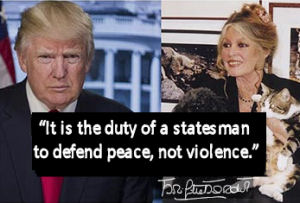
To President Trump
Mr President,
Yet again you parade your contempt for the the necessity of preserving nature, of defending biodiversity.
Having already wrecked the Paris agreement on climate (COP 21), your decision to allow Alaskan hunters to follow bears, wolves and their cubs right into their dens has rightly scandalised world opinion.
You are allowing shooting from helicopters and the killing of hibernating bears, even in protected areas. What cowardice, what a disgrace!
Your friend, Sarah Palin, who is also an ecological catastrophe, will be able to shoot without limits, spreading death. What are you leaving for future generations, should there be any future generations after your massively destructive quest.
In this terrifying world where man destroys everything, causing his own ruin, the duty of a statesman is to have a vision for the long-term, to defend peace rather than violence, including towards the other species that people this planet, who have the same rights as us.
Mr President, I don't know if you will be able to hear my call today via Twitter, which seems to be your official communication medium, but I dare hope that, in a flash of sanity, you will go back on your absurd decision, which represents a crime by humans against nature.
God, what sadness....
Brigitte Bardot
(Translation from French by Sheila Newman)
Coup d'Etat USA? Interview: The Failure of Trump’s Presidency - Paul Craig Roberts and Julian Charles
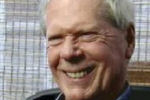 Dr Paul Craig Roberts is interviewed by Julian Charles of The Mind Renewed, UK, for his explanation of President Trump's about turn on all foreign policy. The conclusion is that Trump has been sidelined and others have taken over his role at the White House. The term 'coup d'etat' is not used, but that is what is assumed. Paul Craig Roberts also suggests that the only hope of reducing the United States' dangerous power is for Europe to decouple from it. He says that we cannot hold out hope for the UK to do anything because they are completely tied to the United States, but that if the anti-globalist parties, notably the French National Front, win in Europe, there is some hope that Europe will draw back from the USA-dominated EU. Australia and Canada are held responsible, along with some European leaders, for inexplicably enabling this dangerous situation by supporting the United States in its illegal wars. First Published on Saturday, 22 April 2017 20:50 at http://themindrenewed.com/interviews/2017/1035-int130
Dr Paul Craig Roberts is interviewed by Julian Charles of The Mind Renewed, UK, for his explanation of President Trump's about turn on all foreign policy. The conclusion is that Trump has been sidelined and others have taken over his role at the White House. The term 'coup d'etat' is not used, but that is what is assumed. Paul Craig Roberts also suggests that the only hope of reducing the United States' dangerous power is for Europe to decouple from it. He says that we cannot hold out hope for the UK to do anything because they are completely tied to the United States, but that if the anti-globalist parties, notably the French National Front, win in Europe, there is some hope that Europe will draw back from the USA-dominated EU. Australia and Canada are held responsible, along with some European leaders, for inexplicably enabling this dangerous situation by supporting the United States in its illegal wars. First Published on Saturday, 22 April 2017 20:50 at http://themindrenewed.com/interviews/2017/1035-int130
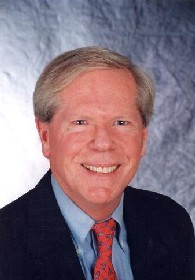
Paul Craig Roberts interviewed by Julian Charles, The Mind Renewed, UK
TMR 171 : Dr. Paul Craig Roberts : Trump Is Over
First Published on Saturday, 22 April 2017 20:50 at http://themindrenewed.com/interviews/2017/1035-int130
We are joined once again by Dr. Paul Craig Roberts, former US Assistant Secretary to the Treasury for Economic Policy, for a discussion on the Trump presidency so far.
Dr. Roberts assesses the performance of the new president and his administration with reference to pre-election promises; shares with us his view that the deep state has effectively neutralised Donald Trump as US president; gives his reaction to the so-called "Syrian gas attack" in Idlib, and the subsequent military action by the US against Syria; and considers the very real prospects for war as Washington steps up its warmongering around the globe.
(Download Podcast HQ 128 kbps)
| Audio Player |
Can Trump dodge his deep state destiny by acting absurdly?
 To many it might seem strange that Donald Trump's recent departure from his election promises has made me think of Marcel Aymé's story about a character in a book who wanted to avoid her destiny. What could a French author of absurd comical novels have to do with the political analysis of Donald Trump's strange about-face from the foreign policy he promised before his election? Marcel Ayme, in "Le Romancier Martin," the first story in Derriere chez Martin, writes of a novelist who developed a bad habit of killing off most of his principal characters and even some less important ones, which made very depressing reading and diminished sales. The characters themselves and Martin's editor complained that their life expectancy was grossly inferior to that of characters in other novels. Madame Soubiron, the wife of a principal character, somehow sensing that she would be next to die, decided to challenge her fate. First she visited the writer and begged him to make certain changes, but he claimed to have little say in what his characters did. Once he had created them, he said, the die was cast. Although it seemed impossible for a mere fictitious character to influence her role, Mrs Soubiron ultimately managed this by deviating from what was expected of her in strange and unusual ways which the novelist could not have considered in advance. For instance, one evening at dinner, she took off her shoe and put it on her plate. Instead of eating the slice of beef she had served herself, she dropped it down the front of her dress and rubbing her stomach, mimed how tasty it was. As she continued to act more and more absurdly out of character, she eventually escaped death.
To many it might seem strange that Donald Trump's recent departure from his election promises has made me think of Marcel Aymé's story about a character in a book who wanted to avoid her destiny. What could a French author of absurd comical novels have to do with the political analysis of Donald Trump's strange about-face from the foreign policy he promised before his election? Marcel Ayme, in "Le Romancier Martin," the first story in Derriere chez Martin, writes of a novelist who developed a bad habit of killing off most of his principal characters and even some less important ones, which made very depressing reading and diminished sales. The characters themselves and Martin's editor complained that their life expectancy was grossly inferior to that of characters in other novels. Madame Soubiron, the wife of a principal character, somehow sensing that she would be next to die, decided to challenge her fate. First she visited the writer and begged him to make certain changes, but he claimed to have little say in what his characters did. Once he had created them, he said, the die was cast. Although it seemed impossible for a mere fictitious character to influence her role, Mrs Soubiron ultimately managed this by deviating from what was expected of her in strange and unusual ways which the novelist could not have considered in advance. For instance, one evening at dinner, she took off her shoe and put it on her plate. Instead of eating the slice of beef she had served herself, she dropped it down the front of her dress and rubbing her stomach, mimed how tasty it was. As she continued to act more and more absurdly out of character, she eventually escaped death.
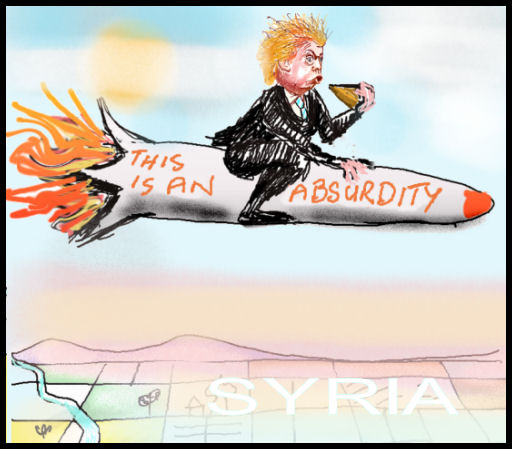
Trump suddenly starts acting out of character
Well, after hearing Donald Trump babbling on about 'beautiful little babies' and not hearing any punchline, then of his ordering the firing of 59 missiles at a Syrian airfield in response to an implausibly attributed chemical weapons attack at Khan Sheikhun, and conveying, furthermore, this news to a Chinese president over a 'beautiful slice of chocolate cake', of course I had a sense of déjà vu. Trump was obviously a fan of Marcel Aymé's and he was using the Mme Soubiron tactic for resisting a fatal and stupid script. Anyone with a slight knowledge of Trump's history on the subject knows that before and during his election campaign, Trump held in utter contempt, had several times denounced as absurd, the idea of intervention in Syria and Obama's near invasion on the basis of specious chemical weapons. Now he was carrying on just like Hillary. Who had a gun to his head? Had his grandchildren been taken hostage?
A cry for help?
When Trump dropped the absurdly outsized and expensive cliched 'mother of all non-nuclear bombs' on caves in Afghanistan, I knew it was an absurdist cry for help. Trump has been surrounded and somehow forced to go along with ISIS fans, Bin Laden obsessives and Putin-Rasputin conspiracy theorists like John McCain, John Kerry, Obama and the Clintons. How did they do it? Many have said that the neocons run the Whitehouse according to a script no-one may escape. Bribery, blackmail, threats and assassination are among the establishment's arsenal, according to John Perkins, author of Confessions of an Economic Hitman. And we all know it anyhow, as that same establishment openly targets anyone standing in its way with assassination: most recently Gadaffi (Hillary Clinton, 'We came, we saw, he died, ha ha ha') and a long list before him: J.F.K, Bobby Kennedy, Martin Luther King and then lots more foreign leaders: https://wikispooks.com/wiki/US/Foreign_Assassinations_since_1945. It has also been suggested that a somehow no less irresistible pressure has been applied by purportedly Zionist son-in-law, Jared Kushner, via Ivanka, Trump's beloved daughter. Shades of King Lear! Another absurdist character. And this Kushner pressure is also supposed to have led to Steve Bannon's departure. See, Steve Bannon exposes Jared Kushner also see How much of Kushner's financing came from George Soros?.
Or has Trump gone mad?
An alternative theory is that Trump has gone mad. Gordon Duff at Veterans today, "Breaking: VT Hit with Stuxnet as Trump’s Complicity in Gas Attack is Confirmed," (April 15, 2017) suggests that Trump is suffering from bi-polar disorder and, under pressure from the situation in the Whitehouse, he has become hypomanic or even manic, with delusions, suggestibility and loss of judgement. However I don't think the madness theory stands up. If Trump was going to lose his mind, it would have happened during that long and grueling election campaign with all the travelling to give speeches, interaction with millions of supporters, and the few hours of sleep nightly. No, Trump showed he had incredible endurance when he was in charge of his own campaign and policies.
Cryptic genius
Another theory is that Trump is conducting a program of such cryptic genius that most mere mortals simply cannot put the pieces together. A bit like Mme Soubiron. Thierry Meyssan of voltaire.net.org writes: http://www.voltairenet.org/en. "Trump : two steps forward, one step back": "Damascus, Syria. Whilst the international press describes Donald Trump's big about-turn, Thierry Meyssan shows that it's not that at all. Far from having abandoned his ideal of peace, the President of the United States shouts and bombs, but always careful not to do anything irreversible...."[1]
Deep state victim
It could still be, however, that Trump has recently being drugged, poisoned, blackmailed, or threatened in other ways. Certainly something has changed. Since no-one outside the White House can be sure of what is happening, it all makes you think that Trump should never have agreed to live at the White House. He should have remained at Trump Towers with his tried and true security forces. But is it even possible to resist the Deep State? They got Gaddafi. They got Bin Laden (they say). And maybe they have got Trump.
What happened to Mme Soubiron, the character who evaded death by her creator? Although she wasn't insane, she finished up in an insane asylum, as the novelist found her impossible to bend to the plot. And the plot went on without her.
Will the Deep State swallow America? Surely America is bigger than the evil dwarfs who run the Deep State! Well, let's hope so. But we need some hobbits or something to help us.
NOTES
[1]"Trump : deux pas en avant, un pas en arrière
DAMAS (SYRIE)
Alors que la presse internationale décrit le grand retournement de Donald Trump, Thierry Meyssan montre qu’il n’en est rien : loin d’avoir abandonné son idéal de paix, le président des États-Unis hurle et bombarde, tout en faisant attention à ne rien commettre d’irréversible.." Source: http://www.voltairenet.org/article196024.html
Just out! Pres Assad debunks alleged chemical weapons attack, fingers US Deep State
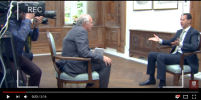 I have transcribed the text from an abbreviated version of President Bashar al-Assad's interview in the embedded video, which was released on 13 April 2017. The guts of President Bashar al-Assad's response to world allegations that Syria's national army attacked civilians with chemical weapons is that the Syrian Arab Army was not in the area at 6-6.30 am when Al-Quaeda alleges a chemical weapons attack took place, they were there around 11.30-12.00hrs. The area had no strategic value for them. Syria got rid of its chemical weapons arsenal in 2013, under international supervision, so what was the army supposed to have used? At the time of the alleged attack, the Syrian Army had the terrorists [Al-Quaeda/ISIS] on the run so why would they [invite punishment from the world community] in carrying out a senseless act with chemical weapons of no strategic importance, if they actually had chemical weapons, which they deny? The film of the alleged incident shows rescuers without any masks or other safety equipment supposedly dealing with people affected by toxic gas that is fatal on contact. Trump's U-turn on foreign intervention policy and US action on the fabricated incident shows that the president has no real power and that the United States is run by the Deep State. Text of statements are under the video inside this article. This transcription is provided because President Assad's English in the abbreviated version is not always completely clear. The entire interview, with English subtitles, is to be found at the bottom of my transcript of the shorter version. It is well worth listening to!
I have transcribed the text from an abbreviated version of President Bashar al-Assad's interview in the embedded video, which was released on 13 April 2017. The guts of President Bashar al-Assad's response to world allegations that Syria's national army attacked civilians with chemical weapons is that the Syrian Arab Army was not in the area at 6-6.30 am when Al-Quaeda alleges a chemical weapons attack took place, they were there around 11.30-12.00hrs. The area had no strategic value for them. Syria got rid of its chemical weapons arsenal in 2013, under international supervision, so what was the army supposed to have used? At the time of the alleged attack, the Syrian Army had the terrorists [Al-Quaeda/ISIS] on the run so why would they [invite punishment from the world community] in carrying out a senseless act with chemical weapons of no strategic importance, if they actually had chemical weapons, which they deny? The film of the alleged incident shows rescuers without any masks or other safety equipment supposedly dealing with people affected by toxic gas that is fatal on contact. Trump's U-turn on foreign intervention policy and US action on the fabricated incident shows that the president has no real power and that the United States is run by the Deep State. Text of statements are under the video inside this article. This transcription is provided because President Assad's English in the abbreviated version is not always completely clear. The entire interview, with English subtitles, is to be found at the bottom of my transcript of the shorter version. It is well worth listening to!
PRESIDENT ASSAD: "Al-Quaeda's forces say the attack happened at 6.00- 6.30 in the morning, while the Syrian [Army] attack was happening around noon, between 11.30 to 12.00. Let's suppose we have this [chemical weapons] arsenal and let's suppose we have the will to use it, why didn't we use it when we were retreating and the terrorists were advancing? Actually, the timing of that attack - or alleged attack - was when the Syrian Army was advancing very fast and actually the terrorists were collapsing in that area. So, why to use it, if you have it and if you have the will, why to use it at that timing and not when you are in a difficult situation? Logically, and this is second, if you have it and if you want to use it again, if we suppose, why do you use it and why do you use it against civilians, not use it against terrorists that we are fighting? Third, in that area we don't have army, we don't have battles, we don't have any object in Khan Sheikhoun and it's not strategic area, why to attack it? What the reason? Military? Of course, the foundation for us morally, we wouldn't do it if we have it [chemical weapons]. We wouldn't have the will because morally this is not acceptable. We won't have the support of the public.
INTERVIEWER: So you mean that you don't have chemical weapons.
PRESIDENT ASSAD: No, no, definitely. A few years ago, in 2013, we gave up all our arsenal and the chemical agency announced that Syria is free of any chemical materials.
INTERVIEWER: Because the Pentagon said that there are chemical weapon in the airbase. You deny.
PRESIDENT ASSAD: Yes. They attack that airbase and they destroy depots of different materials and there was no sarin gas. If they said that we launched the sarin attack from that airbase, what happened to the sarin when they attacked the depots? Did we have [unclear] sarin? Our chief of staff was there a few hours later. How could he go there if there was sarin gas? If the same fabricated videos that we've been seeing about Khan Sheikhoun when the rescuers tried to rescue the victims - or the supposedly dead people or inflicted people - but actually they weren't wearing any masks or any gloves. How? Where's the sarin? They should be affected. Right away. And so, actually, this is the first proof that it's not about the president of the United States, it's about the Regime and the Deep State, or the deep regime, in the United States. It's still the same, it doesn't change. The president is only one of the performers on their theatre. If he wants to be a leader, he cannot, because - as some say, he wanted to be leader, Trump wanted to be leader, but every president there, if he want to be real leader, he later is going to eat his words, swallow his pride, if he has pride at all, and make 180 degree U-turn, otherwise, he will pay the price politically.
Entire Interview with automatically generated transcript plus English subtitles is embedded below:
Why is the West so keen to pick a fight with Russia? - Tucker Carlson interview
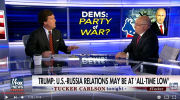 Australian politicians and mainstream journalists seem almost as one in their approval of worsening relations between the two major nuclear powers: Russia and China. Yet a sane person would ask what is so good about this? In the embedded video, Tucker Carlson, US journalist, goes to the US Democrats to find out why they are so keen for the US to pick a fight with Russia. The responses from Alfred E. Mottur, lawyer and Democrat Strategist, who has worked for Mayor Rubio and Hillary Clinton are informatively superficial and illogical. It does seem that the tail wagging the US political dog has lost contact with its brain.
Australian politicians and mainstream journalists seem almost as one in their approval of worsening relations between the two major nuclear powers: Russia and China. Yet a sane person would ask what is so good about this? In the embedded video, Tucker Carlson, US journalist, goes to the US Democrats to find out why they are so keen for the US to pick a fight with Russia. The responses from Alfred E. Mottur, lawyer and Democrat Strategist, who has worked for Mayor Rubio and Hillary Clinton are informatively superficial and illogical. It does seem that the tail wagging the US political dog has lost contact with its brain.
Guilty until proven innocent: Assad and the mainstream press
 Days of incessant propaganda from the ABC, SBS and all other mainstream media toeing the Trump/US Establishment line on chemical weapons in Syria, without any overt logical basis, prompted the author to make a complaint. David Macilwain was in Syria in 2010, corresponds internationally with diverse people concerned about Syria's rights, and has visited Russia twice in the past three years, in a quest to discuss and share views on current events and to build up contacts who might be interviewed by the Australian press rather than the narrow sample usually referred to.
Days of incessant propaganda from the ABC, SBS and all other mainstream media toeing the Trump/US Establishment line on chemical weapons in Syria, without any overt logical basis, prompted the author to make a complaint. David Macilwain was in Syria in 2010, corresponds internationally with diverse people concerned about Syria's rights, and has visited Russia twice in the past three years, in a quest to discuss and share views on current events and to build up contacts who might be interviewed by the Australian press rather than the narrow sample usually referred to.
This morning the ABC’s RN breakfast presenter Fran Kelly interviewed a ‘former adviser to the Syrian government and Bashar al Assad’ – Dr Samir Altaqi - who now lives in Dubai. Ostensibly the purpose of the interview was to find out who might replace Assad once he has been ‘removed’. According to the ABC and other Western media, this removal will happen once Rex Tillerson has persuaded Vladimir Putin to stop supporting ‘the Syrian dictator’.
Unsurprisingly for a member of Syria’s government who has abandoned his own country and moved to one of the West’s local allies in the war on Syria, nothing Dr Altaqi said related to the reality of Syria, where the vast majority of citizens now support both their elected President and their defending Army.
You can judge for yourself here: http://www.abc.net.au/radionational/programs/breakfast/us-tells-russia-to-abandon-syrias-assad/8436004
One has to ask who is responsible for finding such NATO-friendly 'dissident' voices who will back up the accepted narrative, and one which is almost the only view to be heard on the ABC. I had assumed that long-time presenter Fran Kelly, who has pushed a pro-Syrian 'opposition' viewpoint since the start of the war, played some part in choosing her interviewees, but it appears not so simple.
This interview was almost the last straw, following days of incessant propaganda from the ABC, SBS and all other mainstream media, and pushed me to phone the ABC Australia Radio breakfast programme immediately.
I spoke to the executive producer, Cheryl Bagwell, who was impatient and busy and advised me to phone later when the program finished, while at the same time explaining that she ‘didn’t want to get into an argument over Syria’.
When I phoned back, I got the same impatient and petulant response, despite explaining I was a spokesperson for Australians for Mussalaha (Reconciliation)In Syria (AMRIS), and had a complaint over the interviewee’s viewpoint on Assad. She said something like ‘so you support Assad and dismiss his use of barrel bombs and chemical weapons’ – to which I said – “Of course I support him, along with at least 15 million Syrians!”
Then she said something like, 'We’ve had too many calls from your people recently and we’re tired of it'. I’m not ‘your people’ – by which presumably she meant those from Hands off Syria (HoS), who’ve been victimised by the Murdoch Press and the ABC’s Media Watch just recently.
She went off into what seemed to me a bit of a tirade about how the ABC was the best and most balanced coverage of the issue and ‘can you tell me of one that is better?’ – she demanded.
I said that there was nothing that was any better in Australia, as they were all bad and biased and failed to air the Russian or Syrian viewpoint, and I asked if she listened to RT or other non-Western media, mentioning how RT was no different from the ‘independent’ ABC since they are both State supported broadcasters.
She said that only just the other day they had interviewed a Russian analyst – as if any would do. I heard that interview, with the ‘leading Russian military analyst’, Pavel Felgenhauer. (Podcast at
https://radio.abc.net.au/programitem/pgMVjNAZQV?play=true.)
In this interview, the first question was, “At what point will Russia abandon Assad?” Pavel Felgenhauer's response was that Russia won’t abandon Assad - not because Assad isn’t responsible for a chemical weapons attack - but because Russia has invested so much in Syria, both militarily and politically. He said that some Russian advisers should have known that Assad was going to use chemical weapons, but may not have told the Kremlin.
Fran Kelly then asked, “But why would Russia stay so solid behind Assad? What’s the bigger picture?"
Pavel Felgenhauer said that, “Politically it would be too embarassing to abandon Assad, and lose face.” [...] “Russia right now is in a very isolated position, with even China supporting Trump’s actions... "
The ABC’s choice of interviewee in both cases, whether made by Fran Kelly or by Cheryl Bagwell, shows extreme confirmation bias. When I challenged the views espoused by the Russian guest, Bagwell said that he was from Moscow, and would know more than any of us about the situation.
In fact, knowing the views of many Russian analysts and commentators, I would assert that it would be hard to find any others who believed that Assad had actually used chemical weapons, leave alone ‘against his own people’. Just as you wouldn’t find someone from Syria, outside the ‘rebel-occupied’ zones, who would confirm the view that Bashar al Assad is head of an Alawite coterie oppressing the Syrian people.
Whoever is ultimately responsible for choosing the ‘analysts’ and ‘experts’ at the ABC, it is now clear that changing the thinking there is almost impossible. Any voice dissenting from the ABC narrative on Bashar al-Assad, or Vladimir Putin, would be accused of being one of ‘your people’, and their viewpoint dismissed out of hand.
Video: Syrian gas attack is a lie - "Stop your governments!" - Russia
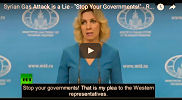 On April 7th, US warships delivered an illegal blow to a Syrian airbase in Homs. Their justification was the recent "chemical weapon" attack on behalf of the Syrian government in Idlib. The Kremlin condemned the strike as an act of aggression against a sovereign state, and a violation of international law. Meanwhile, at the UN, representatives of Western governments attempt to push through a resolution that is based on information taken out of thin air. It includes the removal of Assad, whether or not he was behind the attack. CBS News reporter: Russia says that the airstrike on Khan Sheikhun took place between 11.30 and 12.30 pm. Medics on the ground say that the hit happened hours before that. How so? This is one fascinating question posed to Russian foreign affairs minister, Maria Zakharovna at a press conference on 5 April 2017. See inside the article.
On April 7th, US warships delivered an illegal blow to a Syrian airbase in Homs. Their justification was the recent "chemical weapon" attack on behalf of the Syrian government in Idlib. The Kremlin condemned the strike as an act of aggression against a sovereign state, and a violation of international law. Meanwhile, at the UN, representatives of Western governments attempt to push through a resolution that is based on information taken out of thin air. It includes the removal of Assad, whether or not he was behind the attack. CBS News reporter: Russia says that the airstrike on Khan Sheikhun took place between 11.30 and 12.30 pm. Medics on the ground say that the hit happened hours before that. How so? This is one fascinating question posed to Russian foreign affairs minister, Maria Zakharovna at a press conference on 5 April 2017. See inside the article.
Included video is embedded in article at Fort Russ published & April 2017. The article is a guest contribution on PaulCraigRoberts.org.
Above video embedded in article at Fort Russ published & April 2017. The article is a guest contribution on PaulCraigRoberts.org.
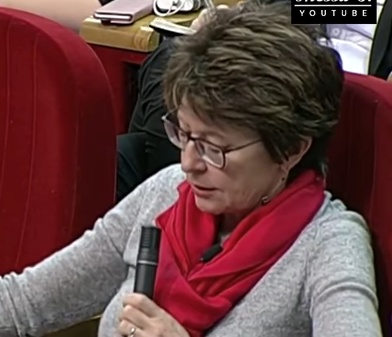
On April 7th, US warships delivered an illegal blow to a Syrian airbase in Homs. Their justification was the recent "chemical weapon" attack on behalf of the Syrian government in Idlib. The Kremlin condemned the strike as an act of aggression against a sovereign state, and a violation of international law. Meanwhile, at the UN, representatives of Western governments attempt to push through a resolution that is based on information taken out of thin air. It includes the removal of Assad, whether or not he was behind the attack.
It is noteworthy, that the only real source of information on what took place, are the videos made by the White Helmets, an infamous propaganda organisation as it pertains to the Syrian civil war. In this clip, Maria Zakharova calls on Western respresenatives/ journalists to hear Russia, and what it has to say. The attack against the Syrian government, much like the Ghouta gas attack in 2013, which precipitated the Syrian civil war, is a giant facade for the military industrial warhawks in the US, to put their money where their mouth is.
Impressive false Flag In Syria analysis by Shroyer and McAdoo
 Lee Ann McAdoo and Owen Shroyer do a fantastic in depth analysis of the history and current stories on chemical weapon use in Syria. The best I have seen. And they take Trump to task. And finger McCain. Alex Jones, who produces Infowars, has been an ardent Trump supporter and some people feared he might get his journalists to pull their punches on Trump if Trump stepped out of line, but this is disproven here.
Lee Ann McAdoo and Owen Shroyer do a fantastic in depth analysis of the history and current stories on chemical weapon use in Syria. The best I have seen. And they take Trump to task. And finger McCain. Alex Jones, who produces Infowars, has been an ardent Trump supporter and some people feared he might get his journalists to pull their punches on Trump if Trump stepped out of line, but this is disproven here.
Don't fall for another chemical weapons story: Idlib Syria US-NATO
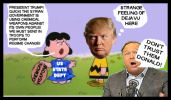 It is weird that the mainstream press and the US-NATO war machine continue to put out the same stories as if they were spam-bots. You would think that real human beings could come up with something more convincing. It is known, however, that people tend to believe a message they often hear repeated, to the detriment of their own eyes and reason, so perhaps this is the intentional modus-operandi of the US-NATO-military industrial media complex. The only way to combat the oft-repeated lie is to repeatedly question it, which we are doing here. Once again the US-NATO deep state war-machine has tried to use the UN like Lucy's football for Charlie Brown, to give authority to accusations against the Syrian government which it actually has no reliable basis for. The consequences could be truly awful - but what do spambots care about World War 3?
It is weird that the mainstream press and the US-NATO war machine continue to put out the same stories as if they were spam-bots. You would think that real human beings could come up with something more convincing. It is known, however, that people tend to believe a message they often hear repeated, to the detriment of their own eyes and reason, so perhaps this is the intentional modus-operandi of the US-NATO-military industrial media complex. The only way to combat the oft-repeated lie is to repeatedly question it, which we are doing here. Once again the US-NATO deep state war-machine has tried to use the UN like Lucy's football for Charlie Brown, to give authority to accusations against the Syrian government which it actually has no reliable basis for. The consequences could be truly awful - but what do spambots care about World War 3?
Do spambots invent US policy in Syria? Has the White House been automated for destruction?
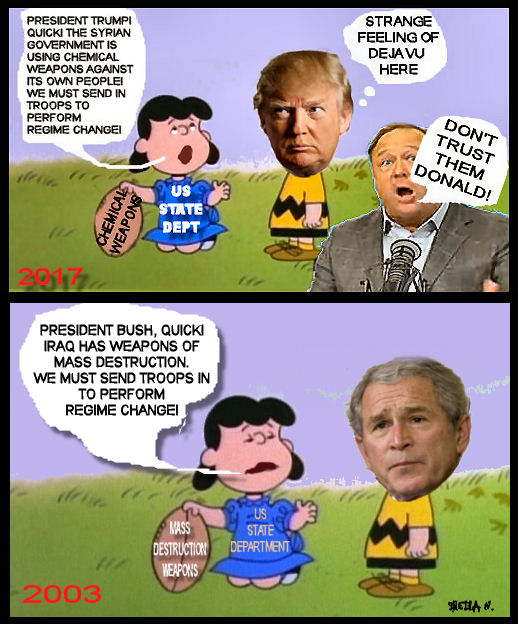
Without credible evidence, without witnesses, without indications, the American president, Donald Trump, and the mainstream news media again have the US trying to convict President al-Assad of 'war-crimes against his own people'. They will try to use this as a pretext for another bloody 'regime change' in the mould of Iraq, Afghanistan, Libya and Ukraine, either to keep an enlarge their military footprint in the Middle East or to obtain concessions from peace-keeping Russia.
It is alarming that President Trump is now marching along obediently to the same evil old tune as Hillary Clinton did, since a primary difference between their platforms was that he would not pursue baseless interventions in the Middle East.
His new stance is suspicious of a sudden loss of power to the neocons who surround him, given that his new US State Secretary said, only last week, that the US would leave the Syrian people to decide who would lead them, and not seek regime change. The chemical weapons story is an old one and not a very good one. Four years ago the news was almost identical, when it was resoundingly repudiated, for example by the Swiss UN investigator, Carla del Ponte. See http://www.bbc.com/news/world-middle-east-22424188. Since then we have heard it many times, picked up then dropped, picked up then dropped again. We republish here a superb 5 April debate and argument from PressTV on this vital subject. In an exercise of logic unfamiliar in the western media, the moderator here asks for a list of for and against points regarding benefits to the Syrian Government or the 'Rebels' in engaging in the purported chemical attacks.
The Debate - Chemical attack in Syria's Idlib
In this episode of The Debate, Press TV has conducted an interview with Marwa Osman, a journalist and political commentator from Beirut, and Michael Lane, the founder of the American Institute for Foreign Policy in Washington, to discuss a recent suspected chemical attack in the Syrian province of Idlib.
Rebel warehouse with chem weapons hit by Syrian airstrike in Idlib – Russian MOD
 "We deny completely the use of any chemical or toxic material in Khan Sheikhoun town today and the army has not used nor will use in any place or time, neither in past or in future," the Syrian army has said in a statement. The Syrian Air Force has destroyed a warehouse in Idlib province where chemical weapons were being produced and stockpiled before being shipped to Iraq, Russia’s Defense Ministry spokesman said. The strike, which was launched midday Tuesday, targeted a major rebel ammunition depot east of the town of Khan Sheikhoun, Russian Defense Ministry spokesman Major-General Igor Konashenkov said in a statement. The warehouse was used to both produce and store shells containing toxic gas, Konashenkov said. The shells were delivered to Iraq and repeatedly used there, he added, pointing out that both Iraq and international organizations have confirmed the use of such weapons by militants. [First published by RT at https://www.rt.com/news/383522-syria-idlib-warehouse-strike-chemical/]
"We deny completely the use of any chemical or toxic material in Khan Sheikhoun town today and the army has not used nor will use in any place or time, neither in past or in future," the Syrian army has said in a statement. The Syrian Air Force has destroyed a warehouse in Idlib province where chemical weapons were being produced and stockpiled before being shipped to Iraq, Russia’s Defense Ministry spokesman said. The strike, which was launched midday Tuesday, targeted a major rebel ammunition depot east of the town of Khan Sheikhoun, Russian Defense Ministry spokesman Major-General Igor Konashenkov said in a statement. The warehouse was used to both produce and store shells containing toxic gas, Konashenkov said. The shells were delivered to Iraq and repeatedly used there, he added, pointing out that both Iraq and international organizations have confirmed the use of such weapons by militants. [First published by RT at https://www.rt.com/news/383522-syria-idlib-warehouse-strike-chemical/]
The Syrian Air Force has destroyed a warehouse in Idlib province where chemical weapons were being produced and stockpiled before being shipped to Iraq, Russia’s Defense Ministry spokesman said.
The strike, which was launched midday Tuesday, targeted a major rebel ammunition depot east of the town of Khan Sheikhoun, Russian Defense Ministry spokesman Major-General Igor Konashenkov said in a statement.
The warehouse was used to both produce and store shells containing toxic gas, Konashenkov said. The shells were delivered to Iraq and repeatedly used there, he added, pointing out that both Iraq and international organizations have confirmed the use of such weapons by militants.
READ MORE: Intl monitoring body & West ignoring reports of ‘chemical attack’ in Mosul – Russian MoD
The same chemical munitions were used by militants in Aleppo, where Russian military experts took samples in late 2016, Konashenkov said.
The Defense Ministry has confirmed this information as “fully objective and verified,” Konashenkov added.
According to the statement, Khan Sheikhoun civilians, who recently suffered a chemical attack, displayed identical symptoms to those of Aleppo chemical attack victims.
READ MORE: Syria hands over evidence of mustard gas attack by rebels on civilians to OPCW (VIDEO)
Hasan Haj Ali, commander of the Free Idlib Army rebel group, rejected Russia’s version of the incident, saying the rebels had no military positions in the area.
“Everyone saw the plane while it was bombing with gas,” he told Reuters.
“Likewise, all the civilians in the area know that there are no military positions there, or places for the manufacture [of weapons]. The various factions of the opposition are not capable of producing these substances,” he added.
At least 58 people, including 11 children, reportedly died and scores were injured after a hospital in Khan Sheikhoun was targeted in a suspected gas attack on Tuesday morning, Reuters reported, citing medics and rebel activists. Soon after a missile allegedly hit the facility, people started showing symptoms of chemical poisoning, such as choking and fainting.
The victims were reportedly also seen with foam coming out of their mouths. While the major Syrian opposition group, the Syrian National Coalition, and other pro-rebel groups put the blame on the attack onto President Bashar Assad’s government, the Syrian military dismissed all allegations as propaganda by the rebels.
"We deny completely the use of any chemical or toxic material in Khan Sheikhoun town today and the army has not used nor will use in any place or time, neither in past or in future," the Syrian army said in a statement.
The Russian military stated it did not carry out any airstrike in the area either.
However, EU foreign affairs chief Federica Mogherini, commenting on the incident, was quick to point to the Syrian government as a culprit, saying that it bears responsibility for the “awful” attack.
US Secretary of State Rex Tillerson echoed Mogherini, accusing the Syrian government of perpetrating the attack calling it “brutal, unabashed barbarism.” He argued, that besides the Syrian authorities, Iran and Russia should also bear “moral responsibility” for it.
4Corners climate change propaganda against Syria by pre-Trump military establishment
Don't mention the role of war in climate change and economic devastation. Why we shouldn't believe that the US military establishment is sincere on its warning to Trump (and the rest of us) on climate change. I would once have swallowed this whole. A bunch of military men from prior US administration proselytise about climate change on this 4Corners program. Of course they totally ignore the role of war in carbon emissions which is probably the greatest contributor to carbon emissions. This is my reaction to the Australian 4Corners program of 20 March 2017.
They talk about a three year drought in Syria as a major cause of the 'unrest', population movement and the 'civil war' in Syria. They don't mention how Israel and Turkey annexed parts of a major river from Syria. They talk about how the consequent 'unravelling of Syrian society' opened up an opportunity for ISIS which. they say, had been born itself from the 'civil war' in Iraq.
They don't mention the US/NATO funding of the so-called rebellion/rebels in Syria, in Iraq, in Afghanistan, in Libya. They don't mention their role in war and climate change.
This story serves as a cover for current and future wars in the Middle East, for the destruction of the Middle East. It also serves as an excuse for mass immigration and creates a perceived need for more military defense.
By occasionally mentioning war as having other causes alongside climate change the film attempt to sound even-handed. But the whole thing comes from the CIA, is politically biased against the current US administration, is politically rather than scientifically founded. With regard to the science of climate change, it is just used here as a cover for war-propaganda.
The major message of this 'documentary' is that 'you need the US military to protect you from mass immigration and terrorism due to climate change provoking civil wars in the Middle East.
The film also gets in some anti-Russian propaganda, blaming Russia for blocking wheat to Egypt on one occasion, presumably to designate the Enemy for future wars.
The film tells us how Africans need more land but points out that Africa has lots of potential agricultural land, but China is grabbing that land. Doesn't mention that there is global investment in those Chinese agribusinesses nor that US and European investors are in competition for that land. Africans themselves continue to be turfed off their traditional land and disorganised, driven to seek their fortunes in megacities where child labor laws are either non-existent or not enforced, making children a source of income for families which have lost their traditional land and incomes.
Overpopulation accompanies urbanisation and 'development'. In third world countries it is not a consequence of better medical care lowering the death rate, since, by definition, these 'improvements' are lacking in such countries, which suffer from untreated Acquired Immunity Deficiency, associated turberculosis, and various delocalised viruses like ebola and parasitic infestations, such as schistosomiasis.
The film calls for greater international cooperation on climate change, but gives little power to people over their local situations, which is the first base to fight climate change or any other environmental ill. It is probably the only base, since the power-elite base that controls armies has no intention of resiling from weapons and war industry and has forced exception from climate change protocol for the military.
So, it's all rhetoric and propaganda: PR for the industrial-military-media machine. Repackaged for Australians in their most trusted investigative program.
The publication of this film by 4Corners shows how the people who select for this show are either incapable of analysing pure propaganda or unable to avoid showing it.
Who is choosing these propaganda programs for the ABC?
‘American public doesn’t share establishment’s hostility towards Russia’ – Reagan's adviser
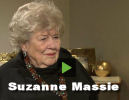 The Cold War has long been over, but it seems, not for all. The idea of reconciling with Russia has been met by fierce resistance on Capitol Hill. Though Trump promised to repair broken relations while on the campaign trail, the new US administration has been forced into a struggle against the nation’s establishment. Will the new president still be able to find common ground with Moscow? Or are we in for Cold War Two? RT's Sophie Shevardnadze asks a former adviser to President Ronald Reagan on Russian affairs, Russia scholar and author – Suzanne Massie. Originally published on RT 13 Mar, 2017 07:24 at https://www.rt.com/shows/sophieco/380460-cold-war-russia-us/
The Cold War has long been over, but it seems, not for all. The idea of reconciling with Russia has been met by fierce resistance on Capitol Hill. Though Trump promised to repair broken relations while on the campaign trail, the new US administration has been forced into a struggle against the nation’s establishment. Will the new president still be able to find common ground with Moscow? Or are we in for Cold War Two? RT's Sophie Shevardnadze asks a former adviser to President Ronald Reagan on Russian affairs, Russia scholar and author – Suzanne Massie. Originally published on RT 13 Mar, 2017 07:24 at https://www.rt.com/shows/sophieco/380460-cold-war-russia-us/
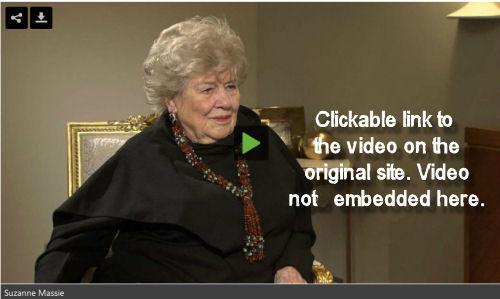 Follow @SophieCo_RT
Follow @SophieCo_RT
Sophie Shevardnadze: Suzanne Massie, adviser to President Ronald Reagan on Russia policy, it's really great to have you on our show today, welcome.
Suzanne Massie: Thank you, I am happy to be here.
SS: The Washington Post says that the White House doesn’t have enough capable experts to advise on Russia anymore, compared to Reagan times. What do you think, are people who are behind the Russian policy in Washington misinformed?
SM: Well, I’d like to be tactful about this, but I do think that we have a lack of such things, at least recently, much more recently. Now, I don't think right now that we have... I don't like the word "expert", but I mean people who really know you, who know the language, who know your history, and who feel your history. I don't feel we have very many like that right now in official positions.
SS: Now, when you started working with President Reagan, he actually reached out to you because he wanted work with people who were outside of the inner circle of Washington experts, right? Do you think the current administration is ready to make an effort like that?
SM: I wouldn’t speak for them. Everybody in America at this moment, it seems, is very confused about our new president and where he's going and what he's going to say next. I think it's too early to tell. I happen to care a great deal for Russia and I have for many years, and I have always maintained the exact position from the beginning and that is you have a lot to give us and we have a lot to give you. We should be together, because together we could do a great deal more than we can do apart for the rest of the world. That's been my position. If they ever wanted to talk to me about that, I would be happy.
SS: Well, you give speeches on Russian relations -why do you think voices like yours are ignored?
SM: They are not. The American public is very-very different from what is now being heard in the U.S. It comes from Washington and it comes from some of the media. Much good stuff exists on the Internet if you want to look for it, but the great public and I say that, basically, sometimes, even Russia forgets that Washington is not the U.S. any more than Paris is the whole France. We have other places and I have been saying: instead of trying to concentrate all the time on Washington you should be concentrating on other places in the United States. Now, I have given lectures in every state of the United States except Alaska and Hawaii, and I have seen the same thing and I've done it now for about 20 years - the same thing. The American people, the public, is always very curious about you, they always want to know, they always say to me: why Russia, why did I go and study Russia? They ask questions, they are always curious and they are not hostile. Americans, even up in Maine, not even Maine, which is a state of fishermen and boat-builders and you know, even the men who came to plough our snow the night before I left - said exactly the same thing as I'm saying to you: "We should be together". "You know" - he kept saying - "You know, I don't like what they're saying, the press". And that is the fact. So I wouldn't take too seriously the things that are said now in limited ways, and say that the public feels that way. No American I have ever met would like to have a war with you.
SS: Well, when I turn on the TV, or read the newspapers...
SM: I know...
SS: ...Anyone who actually speaks out for mending ties with Russia is automatically branded a "Kremlin Spy" - I mean, look at Trump. Is there place for a positive opinion about Russia in American mainstream at all?
SM: Yes. But, remember, who the mainstream is run by - very few people in the end. I don't know how many people actually control the main media - and I'm talking CNN, Fox News, etc. They are corporations and those people are the ones who correct.... Now, I know, that mainstream is what you're hearing, and what I'm saying is: don't pay too much attention to it. It is not the mainstream of public feeling, and yet - listen, I don't hesitate to say what I feel, but I'd tell you... in my lectures, lately, you know what I name them? I name them "A Few Things About Russia Today You May Not Have Read in the Newspapers". And you should see how people flock to hear that.
SS: But the thing is...even if the people themselves are not hostile towards Russia, this one-sided image of Russia in the mainstream leads to concrete actions. For instance, Trump is constantly coming under fire for alleged ties with Russia.
SM: Yes.
SS: But look at President’s National Security Adviser who was actually forced to resign, and that’s after it emerged he was maintaining dialogue with Russian officials. I'm wondering if this is actually going to turn into a McСarthy-era witch hunt against Trump’s administration, just because they want to mend ties?
SM: People have mentioned this, and people as, let’s say, distinguished as Stephen Cohen, whom you may know. I am not sure what's going to happen in the next thing. Because all of our Senators don't feel that way, I don't know about our House of Representatives, but our Senators, many of whom I know, don't feel this way. Many of them have noticed exactly what you're saying. Many, I would say, influential people in the United States - and that means professors, people who are in the field, also have noticed it, and there's quite a reaction against it. So, I'm not sure, it's as pessimistic as you see it.
SS: Hopefully. Now, I want to go back a little bit to your collaboration with President Reagan, because Reagan did choose to negotiate, but at the same time he didn’t back down from military confrontation. What do you think of adopting Reagan’s ‘peace through strength’ policy today? Do you think this military power is needed to preserve stability?
SM: I don't, personally. That's my answer - I don't. I actually am very sorry for the amount of weapons, not only that the U.S. or Russia - or anybody... I really think that the world needs less arms instead of more. There are some people who make a great deal of money from arms and therefore they have a great deal of interest, and seeing precisely that the kind of... well, mainstream that you're talking about. Because I always ask: what point is in it? What are we gaining from this? I think we gain very little. I would like to see much less, and particularly, Ronald Reagan's dream which was less and hopefully no atomic weapons.
SS: So, just to sum this up, do you think that the current administration will overcome the political establishment’s objections to have a thaw with Russia?
SM: I hope so. I hope so. There are many people who are concerned - just because we don't know yet, what form the new administration is going to take. It's not even chosen entirely. I think you’re right, I have observed the same thing. There is a group of people, in Washington, they’re not all transparent, who actually would like to prevent Trump - so it will depend on whether Trump has the guts to go against the whole establishment that he does not know.
SS: You know, The phrase “trust but verify” which Reagan was famous for - you are the one who taught him that, that’s a Russian proverb translated into English - that has since become part of the American political dictionary, actually
SM: Not only the American dictionary. They are selling everything from soup to nuts on television.
SS: Do you think there’s room for trust now? Can American leadership build enough trust with Russia to be able to verify?
SM: I hope so. We were working in that direction. I can tell you, there are masses of people who could, but will they be in power - we don't know that yet. I think we have to wait a little bit and see what happens, and that's the advice I would give to anyone here. It's just wait a little and see what happens before you act too quickly. I don't know what's going to happen, I have no idea. And that, as you know, it's in our newspapers every day - what's going on, what going to happen? We don't know. There are some real people against in the Senate and in the other places, and we'll see who wins in this. But I can only tell you that the public does count and the public does not want war with Russia - and why should they? There's no reason for it. So, I like to trust in the intelligence of the American public - it does have a kind of an intelligence, a collective intelligence. I think the American public was very anxious for a change because of many things, and not just because of you or foreign policy, and they did that and now everybody's adjusting to that change and to new personalities. Reagan, after all, had a lot of experience, governing. He’s been governor of California - a very big state, very important state - for two terms. So he had a lot of experience with the public, remember that. He had been going around, he had spoken for GE and he himself gave that a lot of credit for his being the kind of President he was. But he had an awful lot of appearances. He knew how to talk to the public. Now that's missing right now. Mr. Trump made a lot of money, he didn't necessarily talk to the public a great deal or know the public very well. So... again, we have to wait. But I know how people denigrated Reagan. Oh my, did they do it! They kept saying he was - the same media that you're talking about - said that he was a two-bit actor, that he never read, that he really was kind of stupid and went to sleep all the time, and... that is not true.
SS: Look what happened, he was one of the greatest Presidents of the U.S.
SM: He also read all the time, and that's how he got to know me. He read all of my books.
SS: While we're all waiting to see what happens in America, I still want to ask you a little bit about what's going on right now - people over here, they are really wondering why has Russia today become a scapegoat for everything bad that happens in America. I mean, I don't know if you're big in Twitter or Instagram, but there's even a hashtag #russiansdidit. That's kind of funny.
SM: It's now become a joke, as a cartoon. I don't know if you've seen that part. It’s very funny and it's actually not too polite to even say, but I will say - there's a picture of two dogs and the dog says to one dog: "Guess what, the Russians pooped in the hall!"
Now, you see, blaming even that on Russians. It was all over the place. There are all kinds of jokes about that. People realise, they are not stupid, that this is excessive. I happen to agree with you, I think it’s very dangerous, I have fought it as much as I could because I had the same feeling: that you couldn't say anything. That was like McCarthyism, you couldn't say anything. I decided to figure out how to say and that's why I named those things "A Few Things You May Not Have Read in the Newspapers" - I didn't say bad things about the newspapers, but I did tell them all kinds of things that I saw here, that they were very-very interested. Realise, we don't get very much news about you. And I mean personal news. You know, the things you take for granted.
SS: You what I else I noticed? During the Cold War, the Americans systematically criticised the Soviet Union, but if you look at right now, personal attacks on Russia’s President are prevalent.
SM: That's terrible.
SS: Why do you think the Russian-American relations soured down to the point of personal animosity?
SM: I think it's disgraceful and many agree with me. I don't know… You have to admit that probably, there are some enemies there. They are not exactly transparent. They have done it… that has never happened in our history that I know, that there's been directed so much personally, that I finally said, really, if Mr. Putin actually did all the things they say he did, he wouldn't have time to rule Russia at all. It gets to be... absolutely absurd: all the things that are written. It's not right and I feel it is not correct to do that. I happen to have great pleasure of knowing Mr. Putin a little bit. After all, I was a great friend of Sobchak and I was in St. Petersburg, which is my city, and it's not that big, and so you meet people, you know... and, well, I was once introduced on a Boston radio program as being the only woman in the world who had been kissed by Ronald Reagan and Vladimir Putin. I had to say - "But it was very chaste, it was in the church!" And that's really only because of the old days, in Petersburg. So, personally, I always wish him well, I know how hard a job it is, not only in foreign policy, but right here - how much responsibility, how much difficulty. So, I always watch, with, let's say, an equal eye.
SS: You put an emphasis on personal relations - and Trump wants to fix just that. Can ‘person to person’ contact between the leaders actually turn around the whole relationship, would that be enough?
SM: Reagan did it, and he wanted very much to do it, and he deeply believed in personal relations. That's a matter of record. He always thought that if people could speak face-to-face, you could go much further than any other way, and he put that into practice. I'm sure that you know that none of his advisors, except, perhaps, Mr. Shultz wanted him to meet at all with Mr. Gorbachev. They didn't want it. You know why? They said - "He wasn't up to it" - Reagan, "he was not up to it". Well, Reagan simply said "I want to and I will" and he was supported very strongly by his wife, Nancy, who was all for it. So, they did it against... When I came in to that, I was the only woman, there were no women, it was all, absolutely, men. A male administration and they didn’t want it. He had many of his counselors who were absolutely against him meeting Gorbachev. It was his determination. And you know what else he said? He said: "We are not going to discuss ICBMs and all those initials. We are going to discuss basic things, absolutely basic things - like why are they afraid of us and why are we afraid of them, and that's what we're going to talk about". That was Geneva.
SS: But, then, if we follow that logic, we had Putin and Bush - they had good relations, Obama and Medvedev got along, Obama and Putin - not so much. But if the relations between Great Powers depend on personal relationships between the leaders, doesn't that mean the minute one of the leaders is replaced, then everything - and the understanding that has been there between them goes off track?
SM: Would you think it's also ‘naoborot’ - I mean, they didn't get so well along with Obama, or Hillary, she might have been... I don't think so.
SS: Look where we are right now, I mean, people call this the "new Cold War" era, just because they didn't get along so well.
SM: You're not going to get very far with me on that because I don't think it is, and I do believe in the American public and I don't believe in that little group in Washington or in the media who have decided to mount an attack on Mr. Trump. I don't know Mr. Trump, I don't know what he's going to do. I have some doubts, but I'm willing to give him a little time, he did get elected. I didn't happen to vote either for Mr. Trump or Mrs. Clinton, because I knew them, and I just couldn't. I could not do it. But I'll tell you one good thing that's happening - American people have woken up a lot and…they were pretty much going along, thinking only of themselves, if you want, "they and our own problems", you know. But now, they realise that they hadn't paid enough attention to our own government, and now there's a great deal more interest in grassroots, local, which, I think, is very important. Everybody was kind of asleep, you know, thinking it was all going to go along the same old way, and then, suddenly, it isn't. So, now, everybody is paying a lot of attention.
SS: I want to talk to you a bit about NATO.
SM: Oh God, yes.
SS: So, it happened with the NATO expansion into Eastern Europe which irritates Moscow to this day…
SM: Of course!
SS: So one administration was ready to leave East Europe neutral, but then Bill Clinton and Bush Jr. they decided to expand. All this time Moscow was protesting against this…
SM: I know.
SS: They were very firm about their position in the 90s, the 00s, and the 10s, until this day. Why was it and still is ignored?
SM: I have just said this, at a speech that I gave at the Baltic Forum. I've said, number one, coexistence can never be brought about by force, number one, and that I personally, think that putting soldiers on people's borders is not the way to start a constructive conversation, most particularly with Russia. I think sometimes it will help to simply look at the map and you might understand better - after all, the U.S. is, I would say, very lucky, to have nobody particularly threatening on our borders. We have Canada, we have Mexico, and on the other two siders we have fishes. We have two big ponds with fishes. And that's it. Having worries about borders is not something that we… we’ve been very fortunate about that. But other people do have worries. They do have history, they do remember their history and, of course, Russia above all, does remember its history, not only their recent history, but before that. The big mistake of the Western policy was that the West was making policy about a country that no longer existed.
SS: Americans believe in exceptionalism and exceptionalism has led to interventions and the spreading of liberal values; On the other hand, there's isolationism - like Trump’s America First ideas. Which one do you think will prevail?
SM: I can't tell you who's going to prevail.
SS: What do you think?
SM: I personally think that there's a great mood for thinking about America right now. We have a lot of problems, so I think there may be a move away from, let's say, interfering all over the place or the external policy. I think Americans are ready and desiring to think about themselves, if you think that that's isolationism. In that respect, it will be more thinking about itself, now, than worrying about every other country in the world. We could never forget Russia, but that is something else. But, I really do, I think, perhaps, you're right, that there may be more pulling in.
SS: Finally, I just want to know because, U.S. and Russia mainly disagree on foreign policy - in Syria, on President Trump's confrontation path towards Iran - do you think that Russia and U.S. can manage to cooperate selectively? Do you think they can agree to disagree?
SM: I hope so, I hope so. Why not? After all, nobody agrees with everything anybody else says. I don't really believe that any country is exceptional and absolutely... I think, every country has something to contribute. So, we may not agree, but, at least, we can respect each other's feelings, and not only feelings - history and point of view may not be the same as ours.
SS: Thank you so much for this wonderful interview. Suzanne Massie, adviser to President Ronald Reagan. And we thank Hotel Metropol that gave us an opportunity to record this interview in its Executive Lounge. Thank you.




Recent comments